Support this Work
Read on Substack
Read on Patreon
And Why They Hid The Author
THIS IS AN ABRIDGED & ALTERED VERSION OF THE ORIGINAL JUNE 6th ESSAY
The Shakespeare Authorship Controversy has raged close to 200 years now over the question Who really wrote the ‘Shakespeare’ plays? Answering that question is of utmost importance as the Shakespeare plays have incredibly, buried themselves into the subconscious of the entire world, becoming modern myths that exert an enormous, outsized influence at the deepest level of our collective being- at the level of language in the place where we tell our stories.
Meanwhile the Mythic origin story of the plays themselves, as having been created by a miraculous unlettered rustic from the Midlands, has now been proven to be, without a doubt, an elaborate hoax, originating with the First Folio, a collection of all the Shakespeare plays first published in 1623. None of the plays as literature have anything to do with the life William Shakespeare, and his hometown of Stratford-upon-Avon is never once mentioned in the plays, and the life experience of an Elizabethan working-class person from which William Shakespeare sprang barely appears in plays which focus instead, in heavy detail, the lives of royalty and aristocracy to which William had no access or experience.
The facts show that Shakepseare could barely handle a pen, could not spell his own name correctly and had illiterate parents and illiterate children. There is no evidence he ever went to school. He never received a letter or wrote a letter (none survive) and no one ever saw him writing or spoke of him as a person who wrote, even in his hometown. All the records of his life indicate that he was a part-time actor, a part-owner of a theater, a wool and grain dealer, and an investor in real estate who would sue people for small sums of money. Not one scrap of evidence, besides that someone put his name on the plays, exists for him as a writer of 37 of the most famous plays ever written, all of them dense with book learning, full of detailed history, philosophy astronomy and alchemy sourced from Latin, Greek, Italian and French authors in their original languages in an era before libraries existed.
This essay will show the overwhelming evidence, collected by hundreds of truth seekers for many decades now, that the philosopher of Science, statesman, lawyer, historian, Lord Chancellor and garden designer Baron Verulam, Lord Francis Bacon, Viscount St. Alban was secretly responsible for the plays and for the First Folio hoax. This essay will also explain why the true author of the plays needed to be kept from view.
THE EVIDENCE FOR BACON
The Promus Notebook
Just one single page of the Promus Notebook contains infinitely more evidence for Bacon as the author of the plays than exists for William of Stratford. Stratford Will left zero evidence in his own handwriting that connects him to the plays. Hundreds of pieces of hard evidence in the Promus and elsewhere for Bacon over zero pieces of hard evidence for Will equals infinity.
The Promus Notebook was found in the British Museum in the mid-1800s and it contains hundreds of phrases, written in Francis Bacon’s own hand, that are found in the Shakespeare plays, sometimes exactly word for word.
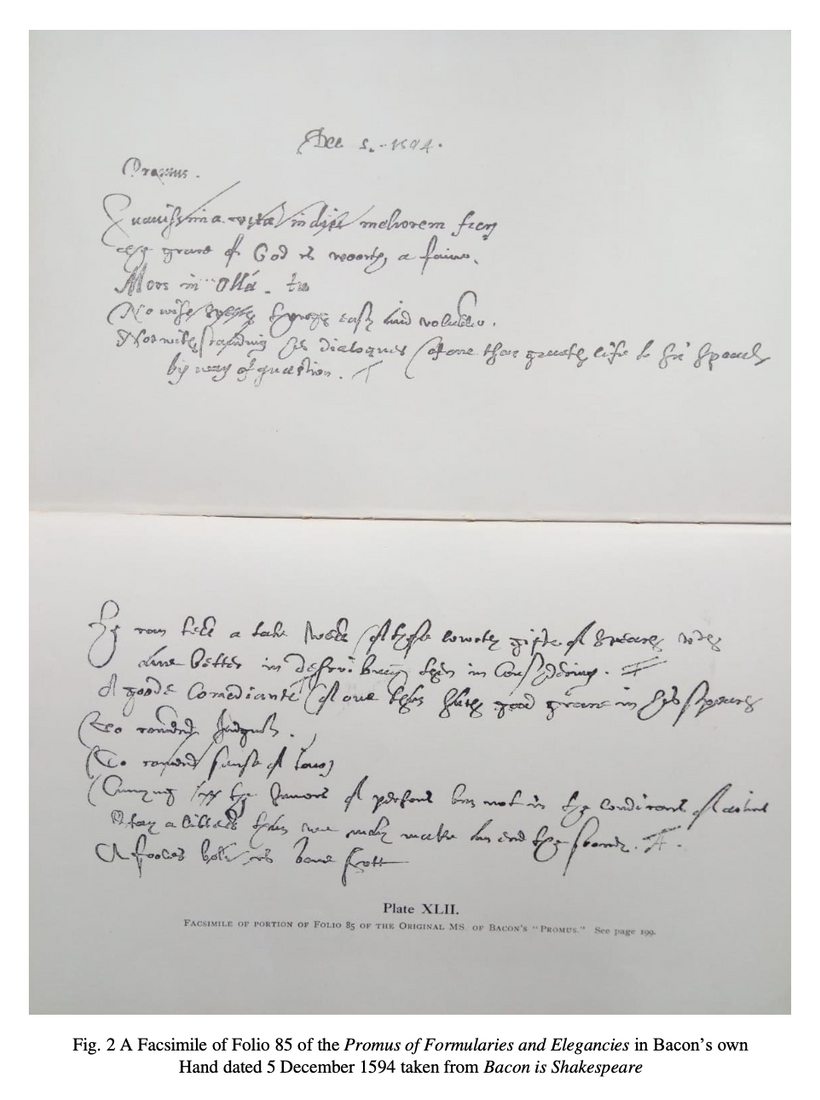
See “a fool’s bolt is soon shot” at bottom of page, in Francis Bacon’s handwriting. 👆That exact phrase appears in two Shakespeare plays. This is just one small example among hundreds.
The existence of the Promus Notebook (1*) should be common knowledge amongst all Shakespeare fans, don’t you agree?
The evidence found in just the Promus Notebook, and Northumberland Manuscript described below, also outweighs the evidence for all of the other authorship candidates combined, such as the Earl Of Oxford or Christopher Marlowe, Henry Neville or Thomas North, but incredibly, these two pieces of hard evidence are only a small fraction of the massive pile of evidence that ties Bacon to the plays. Strap in.
More Than One Writer Involved
One note before proceeding with the detail of the Promus Notebook: It is clear that there was more than one writer involved in crafting the plays and sonnets. This is agreed to now by even the most ardent of mainstream ‘Stratfordian’ scholars. (Stratfordians are those who cling to the notion that Stratford Will Shakespeare wrote the plays. Anti-Stratfordians are those who, based on hard evidence and basic logic, understand that Stratford Will could not have and did not write the plays). The Shakespeare plays, their dense complexity and the elaborate nature of the Shakespeare hoax itself was a project spanning multiple decades and it required more than one person to pull it off. Knowledge of the Shakespeare project had to have gone to the top of the heavy, intense police state that was Tudor London, where spying, espionage and intelligence reached levels previously undreamed of anywhere previously. (2*) Modern espionage was created right there and then, and keeping big secrets in London, perhaps even all of England was impossible.
Bacon operated since the age of 15 at the center of British Intelligence, which at the time centered on his uncle William Cecil Lord Burleigh and Francis Walsingham, along with Bacon, his brother Anthony and the powerful Earl of Essex. You may have noticed that eavesdropping and spying are a constant motif in the plays. Bacon had the skills and the position required to pull off such an elaborate undertaking as the Shakespeare hoax, as well as the means (Queen Bess gave him a private estate on the Thames called Twickenham just across the river from Hampton Court Palace where she often stayed). Bacon had the the contacts and the operational capacity (he is known to have employed a group of writers he called “good pens’) the brainpower and the motive and determination borne of his obsession with empire (3*) to see such an operation through to completion. The Shakespeare Project was a state secret.
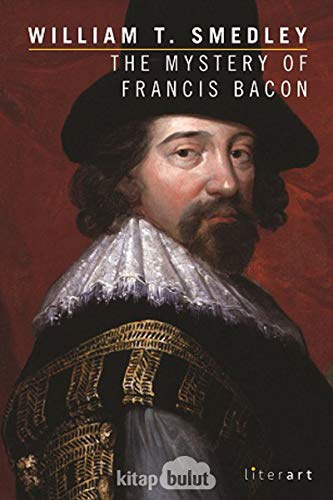
Preliminary Evidence: For Bacon The Timelines Fit Exactly
Before we dive into the hard evidence let’s quickly examine the timeline surrounding that evidence: unlike other popular alternate authorship candidates such as DeVere or Marlowe, and now Thomas North and Henry Neville, and even William Shakespeare, the dates of Bacon’s lifespan perfectly fit the dates of the publishing of the Shakespeare plays and the printing of the all important First Folio in 1623. William Shakespeare of Stratford lived from 1564-1616. Lord Baron von Bacon lived from 1561-1626. All the other candidates mentioned are dead by 1604 except Henry Neville who died in 1615.
Although it’s rarely possible to date the plays with precision, (indeterminacy and ambiguity being a hallmark of the plays, the project and espionage itself) with various techniques a consensus has emerged that the plays were written from about 1588 until about 1612. This dating has developed over many decades, and there is good evidence for it. It’s possible that some of the plays were based on earlier plays never published, as some powereful aristocrats like the Earl of Leicester kept their own private acting companies.
The only serious challenge to this dating system comes from Oxfordians, those highly dedicated souls who believe the 17th Earl of Oxford, Edward DeVere, wrote ALL the plays entirely on his own with his own team of writers, which is ludicrous because hard evidence shows many of the plays were written after Oxford died in 1604.
Francis Bacon was in London during all those years of playwriting and his official employment record for that period shows that he had plenty of free time to write the plays. He was a member of Parliament, but Parliament met for two or three weeks a year, tops. Bacon taught at Gray’s Inn law school but the work was very minimal. Law schools had 35 weeks of vacation a year. (7*) During all those years Bacon published only one book and a few short pieces, until 1605 when he published the important to the history of Science The Advancement Of Learning.
Bacon did not begin to practice the law until just before he was made Solicitor General in 1607, at age 46 under the new King, King James I, who gave him his first real job. Bacon biographer James Spedding, compiler of Bacon’s collected 14 volume Collected Works wrote: “No trace of his professional practice in the courts can be found” (Vol. 1, p. 49). (Spedding was a Stratfordian man by the way, and expressed no interest in the Bacon as Shakespeare theory, yet he makes no attempt to show what Bacon was really doing all those years)
Thus for some 25 years Bacon was a free man, with orthodox scholars unsure of how he spent most of his time from 1581 when he graduated law school until 1607 when he was given the position of solicitor general, which accords perfectly with when the vast majority of the plays were composed. He was living in London at Gray’s Inn and also at Twickenham Park where he composed “merry tales” as he wrote in a letter, mentioned below.
The First Folio and Ben Jonson
As for the assembling of the First Folio, the book that launched the Shakespeare Phenomenon, Bacon was again unemployed, having been famously relieved of all government duties as Attorney General and Lord Chancellor in 1621 due to a bribery scandal. The First Folio emerged two years later in 1623 using playwright Ben Jonson as a key component in creating the hoax of the reputation of Stratford Will as a writer.
Ben Jonson, the second best playwright of the day, a wizard of words and nobody’s fool, was heavily involved in the First Folio hoax and he happened to be a close friend of Bacon’s. Jonson created Shakespeare the man as a writer out of thin air by describing him after his death in the First Folio as the “sweet swan of Avon” with “little Latin and less Greek” yet a great playwright whose work was meant “for the ages”. Strange that Jonson never wrote Shakespeare a letter while he was alive, or even mentioned him once, anywhere, except to perhaps mock him obliquely in a play called Every man out of his Humour (1599). Jonson was a popular and great playwright, and he legitimized the First Folio hoax by putting his name front and center on it.
Ben Jonson subsequently left more clues that Baron Verulam von Bacon was Shakespeare than he left evidence for Stratford Will as we will see below.
The depth of the Bacon-Jonson relationship can be gauged from a verse written by Jonson to celebrate Bacon’s sixtieth birthday on 22 January 1621 in lines that as Spedding puts it, are ‘breathing of nothing but reverence and honour’. Jonson hails Bacon as a ‘happie Genius’ who stands ‘as if some Mysterie thou did’st’. (5*)
Ben Jonson was actually living in Bacon’s house in Gorhambury during the period just before the First Folio was published as ascertained by letters found and analyzed by Spedding. (6*)
This Substack is reader-supported. To receive new posts and support my work, consider becoming a free or paid subscriber.
The HARD Evidence That Bacon Wrote The Plays
The Promus Notebook: 600 entries in Bacon’s own hand that appear in the plays
The Promus of Formularies and Elegancies is a true smoking gun and proof of Bacon’s involvement of authorship of the plays. The Promus is a group of loose sheets called folios, now found together as a notebook, that was found in the mid-1800’s in the British Museum by James Spedding, the biographer, compiler and editor of the 14 volume The Works of Francis Bacon, published between 1857 and 1874, which is the standard reference for Bacon’s work. Here is a description of the notebook by some present day editors of a new edition of Bacon’s collected works:
“With the Promus of formularies and elegancies, we come to texts that Bacon had no intention of publishing, in print or otherwise. These are an assortment of his working papers, some of them no more than jottings from his reading, a few perhaps halfway to becoming rough drafts of more ambitious works. Surprisingly, they have been little studied.”
[Alan Stewart with Harriet Knight, eds., The Oxford Francis Bacon: Early Writings 1584-1596. (Oxford Clarendon Press, 2012), p. 507
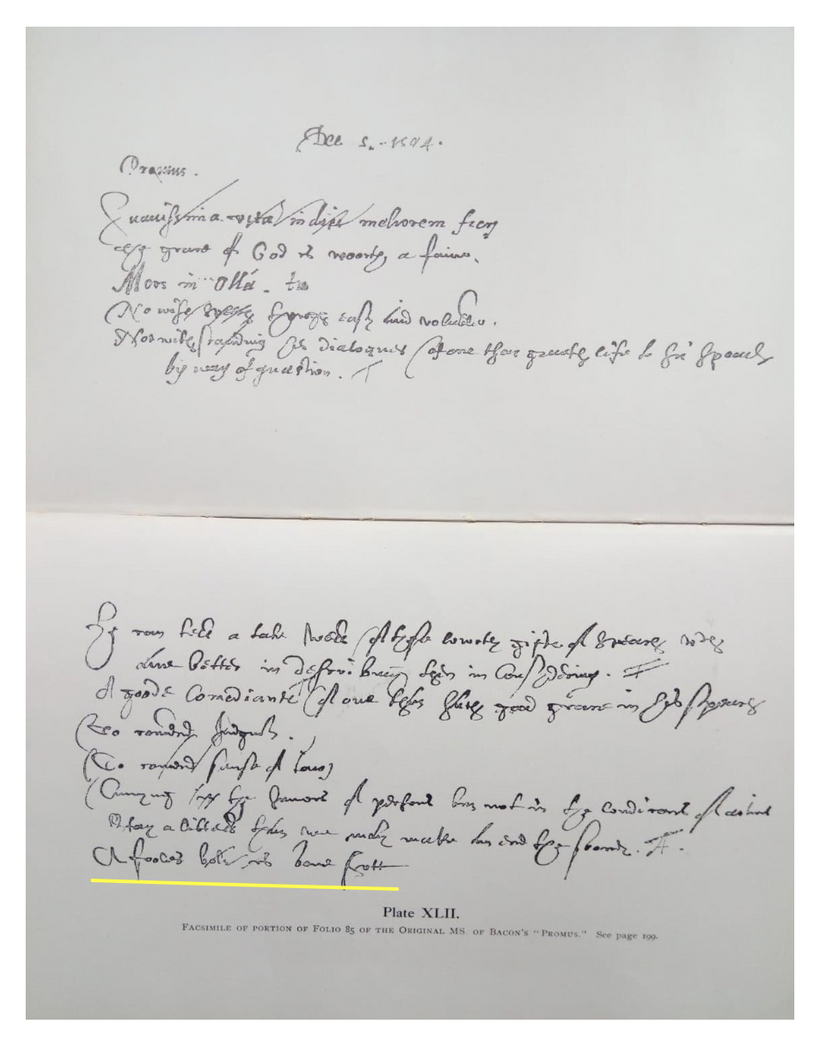
A fool's bolt is soon shot from The Promus Notebook also in Henry V Act 4, Scene 7
The Promus Notebook as it has come to be called, is labeled as MS. Harlein 7017 in the British Library, in Francis Bacon’s handwriting, contains sayings in Spanish, French, Italian and Greek that could be of use in his writing. ‘Promus’ means ‘storehouse’ in Latin and the pages comprise a writer's notebook of ideas to remember and use when writing. The long list includes sayings and phrases by Virgil, Seneca, Horace, Ovid and Terrence, ancient Roman poets and playwrights whose work is found in abundance in the Shakespeare plays.
The fact that Bacon wrote the entries has never been disputed and is affirmed by Spedding and paleographers (handwriting experts). There are 1,655 entries. An English woman named Constance Pott had the entire notebook printed in 1883 along with the parallels that she found between the notebook and the Shakespeare plays. Sir Edwin Durning Lawrence also printed it in 1911. Today you can find it on the internet. The notebook contains two dates - December 1594 to January 1596, (the dates being written on the pages) which is two years before a Shakespeare play was first published with attribution to Shakespeare.
A recent analysis of the Promus by N.B. Cockburn, a British lawyer, for his book The Bacon Shakespeare Question found 600 parallels between the Promus notebook and the Shakespeare plays, some of which are word for word identical. The 600 figure represents about half the number that early Baconian and founder of the Francis Bacon Society, Constance Pott found, N.B. Cockburn being a lawyer and all.
Here are some of them:
Promus ―All is well that ends well.
Title —-All’s Well That Ends Well
Promus ―To slay with a leaden sword.
Love’s Labour’s Lost Act 5, Scene 2 ―Wounds like a leaden sword.
Promus ―Things done cannot be undone.
Macbeth, Act 5, Scene I ―What‘s done cannot be undone.
Promus ―To stumble at the threshold.
3 Henry VI Act 4, Scene 7 ―Many men that stumble at the threshold.
Promus ―A Fool‘s bolt is soon shot.
Henry V Act 4, Scene 7 ―A Fool‘s bolt is soon shot.
Promus ―He stumbles who makes too much haste.
Romeo and Juliet Act 2, Scene 3 ―They stumble that run fast.
Promus ―Good wine needs no bush.
As You Like It Epilogue ―Good wine needs no bush.
Promus ―An ill wind that bloweth no man to good.
2 Henry IV Act 5, Scene 3 ―The ill wind that blows no man to good.
Promus ―Thought is free.
Twelfth Night Act 1, Scene 3 ―Thought is free.
The Tempest Act 3, Scene 2 ―Thought is free.
Promus ―He who has not patience has nothing.
Othello Act 2, Scene 3 ―How poor they are that have not patience.
Promus ―All that glisters is not gold.
The Merchant of Venice Act 2, Scene 7. ―All that glisters is not gold.
Promus ―Happy man, happy dole.
Merry Wives of Windsor Act 3, Scene 4 ―Happy man be his dole.
1 Henry IV Act 2, Scene 2 ―Happy man be his dole.
The Taming of the Shrew Act 1, Scene 1 ―Happy man be his dole.
The Winter’s Tale Act 1, Scene 2 ―Happy man be his dole.
Promus ―Seldom cometh the better.
Richard III Act 2, Scene 3 ―Seldom cometh the better.
Promus Chi semina spine non vada discalzo.
(He who sows thorns should not go barefoot.).
To mow down thorns that would annoy our foot 2 Henry VI: 3: 1
But O, the thorns we stand upon! The Winter's Tale: 4: 4
Promus 926 Nadar y nadar y ahogar a la orilla. (To swim and swim and drown close to the shore.)
’Tis double death to drown in ken of shore; The Rape of Lucrece: line 1114
Promus 669 The world runs on wheells.
Then may I set the world on wheels The Two Gentlemen of Verona: 3: 1
Promus 629 To cast beyond the moon.
I aim a mile beyond the moon. Titus Andronicus: 4: 3
Promus 648 For the moonshyne in the water. O vain petitioner, beg a greater matter.
Thou now requests but moonshine in the water. Love’s Labour’s Lost. 5: 2
Promus 661 Out of God’s blessing into the warme sunne.
Thou out of heaven’s benediction com’st To the warm sun. King Lear: 2: 2
Promus 259 Sit omnis homo velox ad audiendum tardus ad loquendum. Jam. i. 19. Let every man be swift to hear and slow to speak.
Give every man thine ear but few thy voice. Hamlet: 1: 3
Promus 562 Romanus sedendo vincit.-Er. Ad. 329. (See Isaiah xxx. 9: ‘The Roman conquers by sitting down’- i.e. by patience, scheming, or wearing out his adversary.)
LIEUTENANT:Sir, I beseech you, think you he’ll carry Rome?
AUFIDIUS: All places yields to him ere he sits down Coriolanus: 4: 7
Promus 869 Riper than a mulberry
Now humble as the ripest mulberry Coriolanus: 3: 2
Promus Any one can manage a boat in calm weather.”
“When the sea was calm, all Show’d mastership in floating.” Coriolanus, iv. 1
Promus “To cure deafness is difficult.”
“Your tale, sir, would cure deafness.” The Tempest
Promus “Love me little; love me long.”
Love moderately ; long love doth so.” Romeo and Juliet, ii. 6
Promus “To live long, one must be patient.”
You are so fretful, you cannot live long.” 1 Henry IV., 3
Promus To drive out a nail with a nail
“One nail by strength drives out another.” Coriolanus iv 7
Promus “Consider the varying chances of war.”
“ Consider, sir, the chance of war; the day was yours by accident.” Cymbeline, v. 5
“ Now good or bad, tis but the chance of war.” Troilus and Cressida, Prologue
There are many many many more, some more glancing and suggestive but all clearly linked.
N.B. Cockburn, The Bacon Shakespeare Question, And The Promus
In an astonishing work of detailed scholarship, N.B. Cockburn patiently addresses the Shakespeare authorship question for over 700 pages. He refuses to uses any ciphers or code-breaking to reveal secret messages that has made Baconians look silly over the years. Cockburn sets up the argument like a lawyer, systematically and carefully building his case.
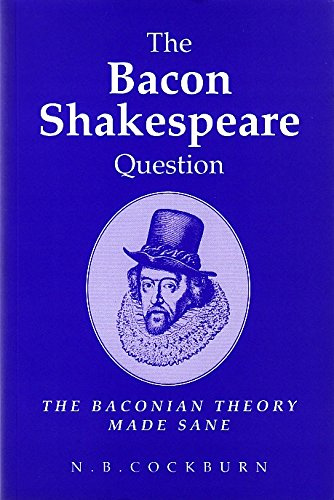
Cockburn finds a a single folio (page 112) of the Promus remarkably yielding multiple parallels together in Romeo and Juliet, which is much too elaborate to go into here. (The Bacon-Shakespeare Question, (NB Cockburn pg 518)
According to Cockburn, who gives Stratfordians every chance to explain themselves throughout the book, as a good and fair lawyer would, the few Stratfordians that have addressed the Promus Notebook have tried to belittle it, saying “there are parallels with all the other playwrights as well” thereby admitting to the parallels in the Promus, but never actually providing the parallels they see with other writers. Some Stratfordians say, well, ‘they were reading the same things’, or ‘Bacon was reading Shakespeare’! The problem is Romeo and Juliet wasn't in quarto form till 1599, but the Promus Notebook has dates in it of 1594 and 1595, around the time Romeo and Juliet was being written. The dates again add up perfectly .
SMOKING GUN 2: The Northumberland Manuscript
This next piece of evidence is mind blowing, and along with the Promus settles the fact that Francis Bacon was highly involved in the Shakespeare Hoax.
In 1867 a bundle of manuscripts was found in the Northumberland house, in Charing Cross London, not far from Bacon’s former family home at York House on the Strand. (Bacon had multiple residences. York House is where he was born and lived at various times until his fall from grace in 1621) The bundle of folded pages was covered by a folded page on which was written the the contents of the bundle, which were manuscripts of writings by Francis Bacon. Also included in the folder, according to the table of contents listed on the front were two Shakespeare plays, Richard II and Richard III.
The name William Shakespeare is found multiple times on the front cover and it is the earliest known example of his name in manuscript form! There is no dispute among the experts about the ownership of this folder- it belonged to Francis Bacon.
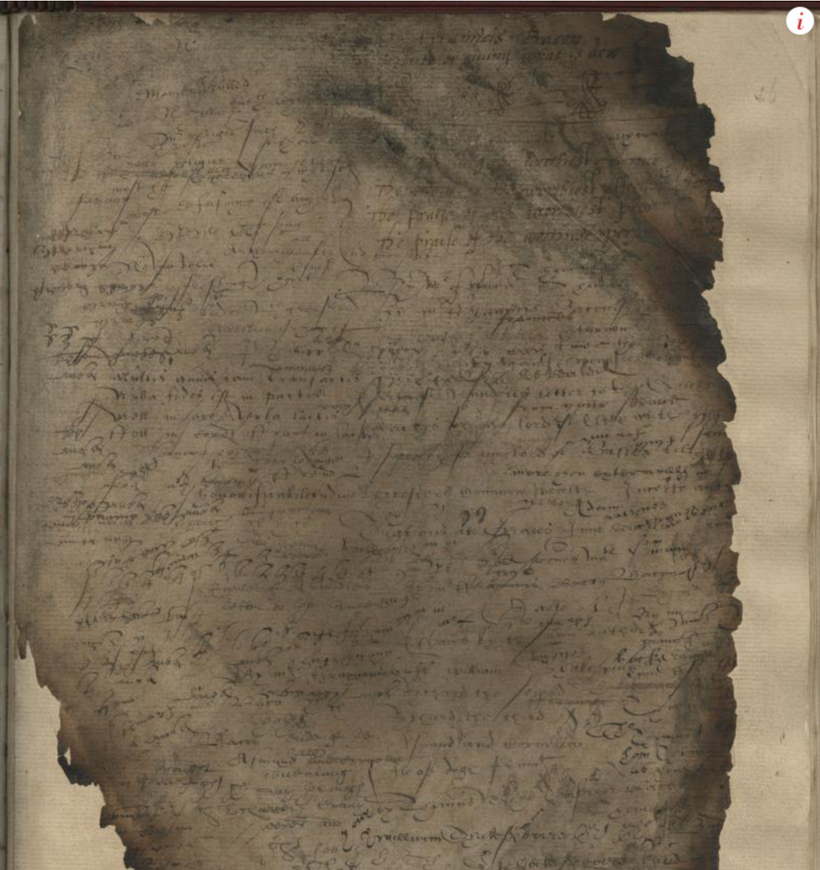
The Northumberland Manuscript Cover
The front cover page/contents page was used by scribes (Bacon kept a team of assistants he called “good pens’ in employment) as a writing pad to practice on and get the ink flowing from the quills. Above is a photo of the contents page, and below are two facsimiles showing more clearly what is on the page. The contents of the folder are various essays written by Bacon, one being a speech for the Earl of Essex. The two plays by William Shakespeare, Richard II and Richard III, were no longer in the folder, perhaps having been removed for the printer. Richard II and Richard III are two of the earliest plays published, as anonymous quartos, in 1597 which is the year to which the folder has been dated. Some of the contents found in the folder date back to 1584.
Incredibly, the name William Shakespeare appears right next to the name Francis Bacon on the cover, in one place even saying “ fffraauncis Bacon your William Shakespeare”! Dude, case closed. Both names, Bacon’s and Shakespeare’s, are written multiple times on the contents sheet.
The manuscript is today kept at Alnwick Castle in Northumberland, and is the property of the Duke of Northumberland. The Northumberland Dukes figure prominently in the Shakespeare plays, even serving as the heroes in Macbeth-it is the Earl of Northumberland who raises an army of Englishmen to invade Scotland and kill Macbeth.
Francis Bacon’s real father, the Earl of Leicester Robert Dudley, his father WAS THE Duke of Northumberland. Probably just a coincidence.
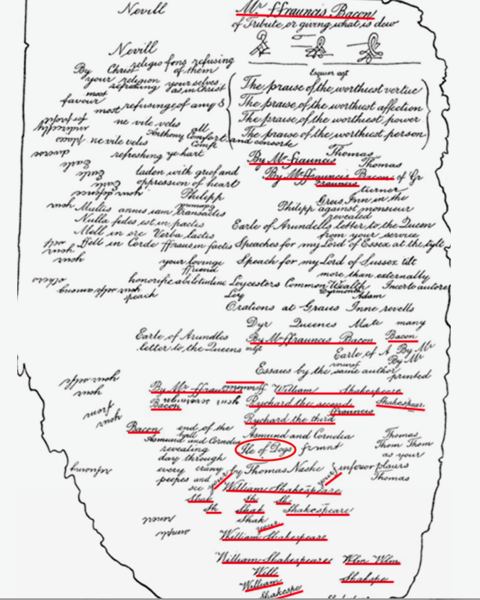
Northumberland Manuscript facsimile
The Northumberland Manuscript is the second smoking gun. The full implications of it are enormous. Very few Stratfordians have engaged with this piece of evidence as it is so damaging to their case.
The name Neville appears also as does playwright Thomas Nashe. This video explores the Northumberland manuscript in depth.
Smoking Gun 3: First Performance Ever Of A Shakespeare Play
Was the “Comedy Of Errors” At Gray’s Inn
The first definite, documented performance of any Shakespeare play is the Comedy Of Errors and it took place at Gray’s Inn, the law school Bacon attended and where he kept a suite of rooms his entire life, during the “Christmas Revels” when Bacon was heavily involved in staging the entertainment. Gray’s Inn is still training barristers in the same location and sports a massive bronze of Baron Verulam in “The Walks”- the gardens that Verulam himself designed.
Back in Bacon’s day, Gray’s Inn held what were called the Christmas Revels each year. These were the ‘twelve days of Christmas’ and it was a party from December 25 to January 6, culminating in the all important Twelfth Night, a grand occasion for all of early modern London, a bit of a Saturnalia, and the very title of a Shakespeare play.
In 1594, Francis Bacon was heavily involved, if not in charge of the entertainment for the Revels that year, having been made a ‘bencher’ (meaning he served as a part-time administrator). That year Shakespeare’s Comedy Of Errors was performed. We know this from a document, published in 1688 entitled Gesta Grayorum. This is mainstream accepted Startfordian history. From the website “Shakespeare’s Globe” we read:
“We know about this early performance [Comedy Of Errors] because someone wrote an account of the Inn’s Christmas festivities of which the play formed a part. This tongue-in-cheek document, with the deliberately overblown title Gesta Grayorum (Latin for ‘The Deeds of Gray’), was later published…in 1688.”
Bacon’s involvement with writing the Gesta Grayorum is not in dispute, attested to by James Spedding, certainly a Stratfordian, the Victorian editor of Bacon’s collected works, with another attestation of Bacon’s involvment being prominent Shakespeare scholar E.K. Chambers.
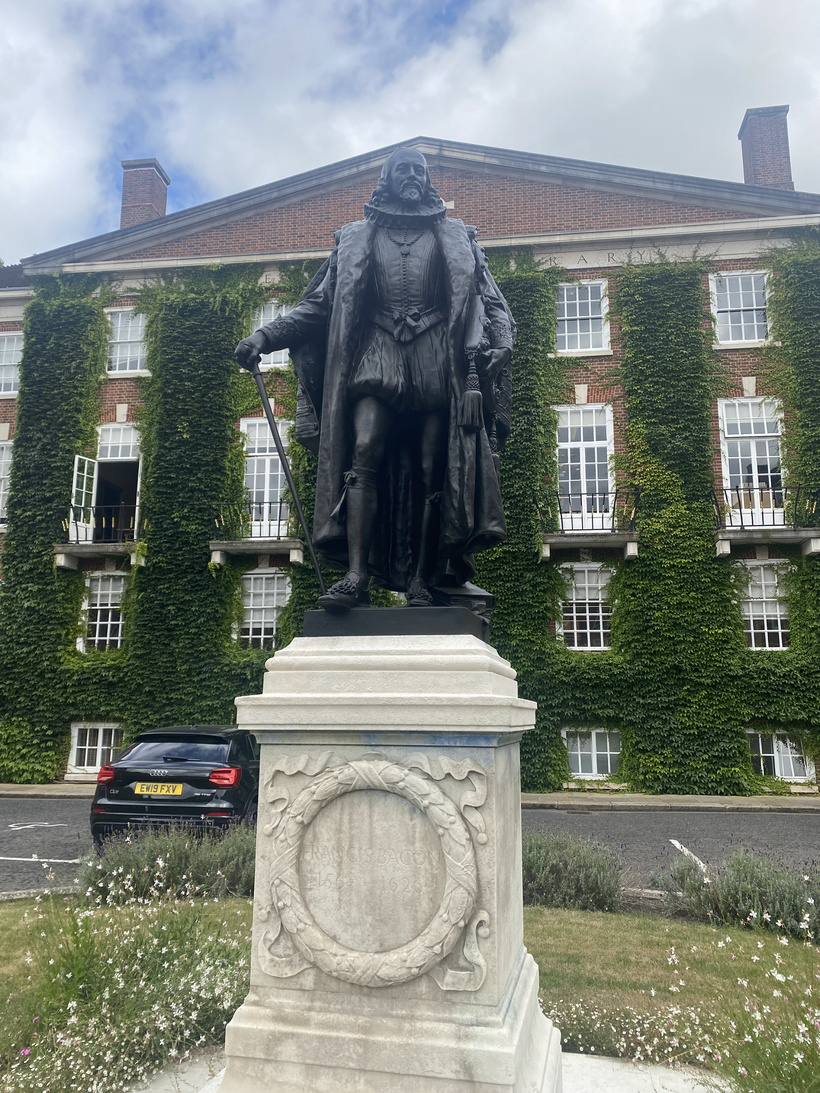
Bacon Statue at Gray’s Inn Law School Where First Ever Performance of Shakespeare Occurred
Bacon was a part-time administrator at Gray’s Inn and engaged in helping to schedule and write the entertainment when the first ever documented performance of Shakespeare play took place. What a coincidence! It is thought that two Shakespeare plays were performed, the other one being Love’s Labor’s Lost, which has significant ties to Bacon. (8*) These performances of the Shakespeare plays are the third smoking gun.
The Fourth Smoking Gun: Love’s Labor’s Lost
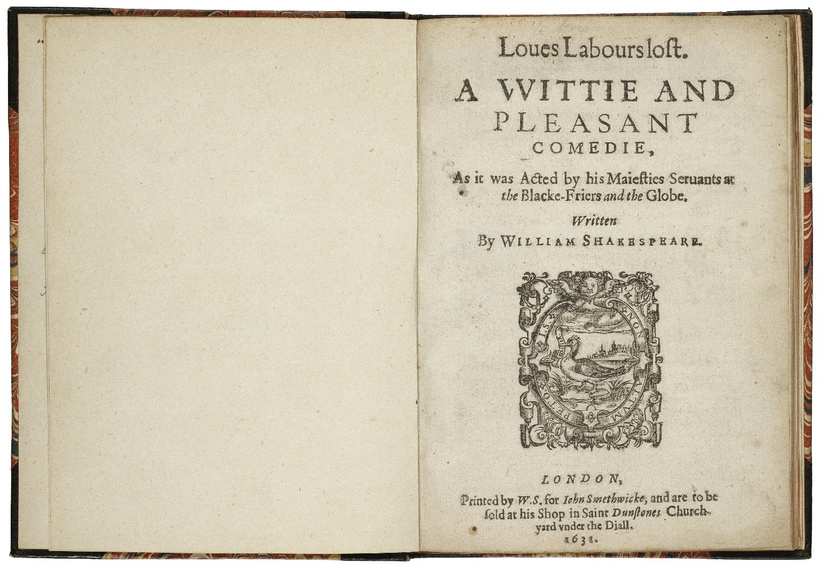
The comedy Love’s Labors Lost is strongly tied to Francis Bacon even more so than most of the other plays, and it comprises the fourth smoking gun for evidence of Bacon’s authorship.
What makes Love’s Labors Lost provably written by Bacon is that the names of four the principal characters in the play are found in Anthony Bacon’s passport, an occurrence which goes far beyond chance and serves as an in-joke for Anthony and his friends. Anthony was living with Francis at Gray’s Inn at the time of the 1594 Christmas Revels.
The four principle characters are named Longaville, Biron, Dumain,and Boyet. Anthony Bacon’s passport, housed in the British Museum, has four clear signatures- Longaville, Berowne Dumaine, and Boyet. Dates show the signatures were written between 1583 and 1592.
Anthony Bacon looms large in the story of his brother the great Baron Verulam and as well in preparing the hoax of Stratford Will. Anthony was a poet and a spy. Elizabethan Poetry as a means of espionage and a type of twilight communication has been studied by the CIA and James Jesus Angleton. (9*) Anthony was extremely close to his brother Francis as well as to the ill-fated Earl of Essex. The three had their own espionage network. Anthony died young, soon after the Earl of Essex lost his head, both exiting stage left in 1601.
The story of LLL takes place in France, specifically in Navarre, where parts of the French Court kept residence. Francis Bacon was sent to France by Queen Elizabeth and Frances Walsingham at the age of 15 on a diplomatic/espionage mission with Amyas Paulet, and he spent three years in the French Court, associating with the Pleiades group of French intellectuals who were determined to modernize the French language. LLL has clear and obvious sources in these events in Bacons life. The Pleiades group inspired Bacon to do the same for the English language. Anthony Bacon was closely associated with much of this group as well, living in France for many years as a spy.
The three years that prodigy Bacon spent in France were critical for the rest of his life and even to world history. It was during this time that Bacon invented his famous bi-lateral cipher system for hiding secret messages in normal looking text, a cipher that keeps silly Baconian’s searching for secret messages in the plays. I don’t play that game but there are no doubt hidden messages, especially in the First Folio. Whatever messages are supposedly in there might just be another misdirection game from the greatest liar of all time, Francis Bacon.
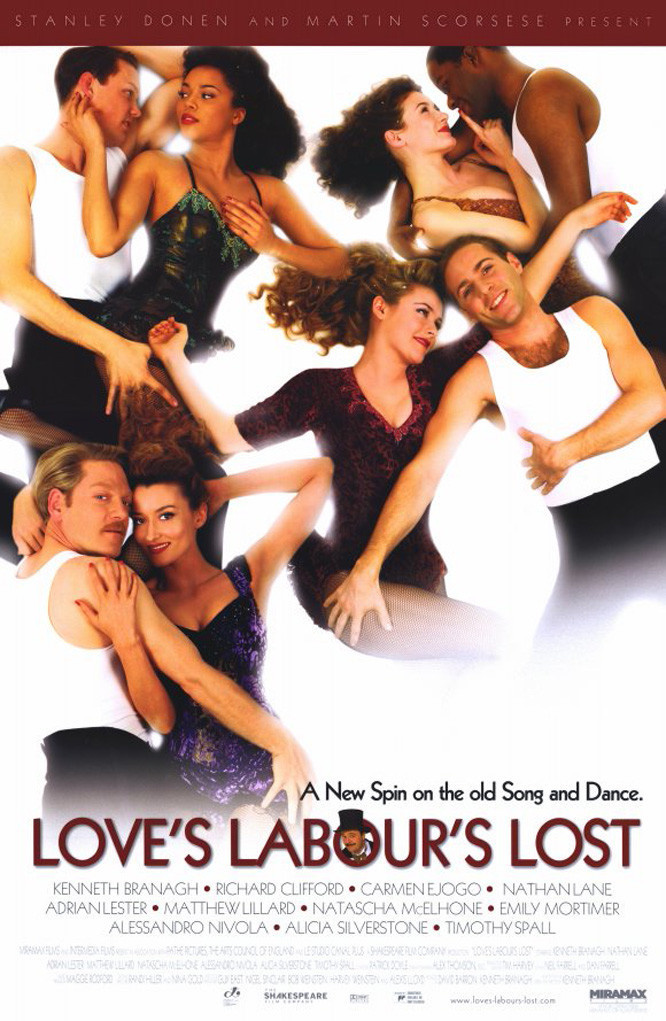
The Plays Just Keep Coming At Ya: A Modern Love’s Labor’s Lost
Francis Bacon as the originator of modern Freemasonry has been taken up in another essay. France is where the Knights Templar, a huge source for Freemasonry, were born. It’s also where they were slaughtered, and no doubt where remnants remained, as they also remained in London and Scotland.
Freemason Richard Allen Wagner says LLL is the most Freemasonic of all the plays, even with the stiff competition from plays like Hamlet, Macbeth and The Tempest. I can confidently state that all the Shakespeare plays that I have read contain veiled symbolism meant for Masonic initiates.
Freemason Alfred Dodd, in his book Francis Bacon’s Personal Life-Story, writes:
“And when we know, as every Mason does-or ought to-that this play [Love’s Labors Lost] embodies the genesis of the Craft, the natural conclusion is that among other things Francis and his friends were trying out some of their Rituals of the Higher Degrees”.
Dodd embellishes this thinking in his book Shakespeare, Creator of Freemasonry.
A detailed analysis of LLL as a part of early Freemasonry will be in another essay.
Secondary Evidence
Parallels Of Thought: Hundreds Of Bacon’s Opinion’s Found In Shakespeare
It is astonishing how often a direct parallels of identical thought or feeling or opinion expressed in Bacon’s voluminous writing pops up in Shakespeare. The obvious explanation is that Bacon wrote Shakespeare. For instance,
Contempt For Commoners
The Shakespeare play’s contempt for commoners is legendary, even given the rarity of a commoner’s appearance! Shakespeare gave commoners names like Dull, Bottom, Mistress Quickly, Mistress Overdone, Caliban (anagram of Cannibal). Comic relief always comes from the low-born. The “rude mechanicals” in A Midsummer Night’s Dream are portrayed as extremely stupid, extremely deferential to nobility and as laughing stocks to the high-born courtiers.
David Shelley Berkeley in his book Blood Will Tell in Shakespeare’s Plays writes: “Shakespeare almost always depicts the base-born as being notably less human than non-degenerate ‘gentles’…the base-born, if aspiring, are humiliated or if competent within their spheres are left to their own devices.”
Diana Prices states in Shakespeare's Unorthodox Biography: New Evidence of an Authorship Problem “Shakespeare consistently emphasizes the virtues of the well born and the deficiencies of the base-born, magnifying any such distinctions found in the source material” and “one could flip through the catalogue of Shakespeare’s base-born characters and be hard pressed to find fully developed three dimensional individuals”.
Acclaimed Shakespeare scholar Northrup Frye: “[Shakespeare] was interested in chronicling the personal actions and interactions of the people at the top of the social order…Shakespeare’s social vision is a deeply conservative one”. This attitude to commoners is unique amongst Elizabethan playwrights, and is especially strange given Stratford Will's humble beginnings.
Well it just so happens that Lord Bacon was a well known snob, and he wrote of his disgust for commoners repeatedly. In his book on the Greek myths, The Wisdom Of The Ancients Bacon wrote of the
“innate depravity and malignant disposition of the common people”. (Spedding 6(2). 703) …“The nature of the common people, always swelling with malice towards their rulers, and hatching revolution or sedition, is feminine.” In another piece he wrote “multitudes who can never keep within the compass of any moderation” (Spedding 10.107).
From Bacon’s essay On Praise:
“If it be [praise] from the common people, it is commonly false and naught, and rather followeth vain persons than virtuous; for the common people understand not many excellent virtues. The lowest virtues draw praise from them, the middle virtues work in them astonishment or admiration, but of the highest virtues they have no sense or perceiving at all”.
I wonder what Bacon considered the ‘highest virtues’ of the elite which a common person just could not possibly conceive?
Support For The Monarchy
Politically, in terms of support for the monarchy and system of nobility there are many congruences. When Bacon’s close ally and confidante the Earl of Essex was on trial for treason, Queen Elizabeth made Bacon prosecute him- and Bacon stated at the trial: “By the common law of England a Prince [sovereign] can do no wrong”. From Pericles (Act 1 Scene 1) “ Kings are earth’s Gods; in vice their law’s their will; And if Jove stray who dares to say Jove doth ill?”
Both Bacon and Shakespeare use the word ‘degree’ to describe the feudal hierarchy they love. Bacon: “Nothing doth derogate from the dignity of a state more than a confusion of degrees”. In Troilus and Cressida, Ulysses says: “Take but genre away…and hark what discord follows.”
The Comedy Of Errors and The Merchant Of Venice are the only two plays that have a setting that is not aristocratic.
Hundreds Of Parallels
Entire books have been written showing the enormous number of parallels in thought and opinion between Bacon’s philosophical writings and passages in the Shakespeare plays. Edwin reed did an excellent job in 1902 with Bacon and Shakespeare Parallelisms.
Here’s a few:
Shakespeare: Act V, Scene 5, Macbeth. ‘Tomorrow, and tomorrow, and tomorrow is a tale told by an idiot, full of sound and fury, signifying nothing’.
Bacon: Religious Meditations “The Spanish have a proverb, tomorrow, tomorrow, and when tomorrow comes tomorrow”
In a letter to King James: “It is nothing else but words, which rather sound than signify anything.”
Shakespeare: Hamlet, Act II, Scene 3: “Though this be madness, yet there is method in it.”
Bacon: Novum Organum “they were only taking pains to show a kind of method and discretion in their madness”.
Shakespeare: Hamlet, Act I, Scene V, Polonius: “From the tables of my memory I’ll wipe away all saws of books.
Bacon: Redagutio Philosophiarum: “Tables of the mind differ from the common tables…you will scarcely wipe out the former records unless you shall have inscribed the new.”
Shakespeare: Hamlet, Act II, Scene II, Polonius: “Though this be madness, yet there is method in it.”
Bacon: Novum Organum: “They were only taking pains to show a kind of method and discretion in their madness.”
Shakespeare: Hamlet, Act I, Scene III, Polonius: “To thine own self be true, and it must follow as the night the day, Thou canst not then be false to any man.”
Bacon: Essay of Wisdom: “Be so true to thyself as thou be not false to others.”
Shakespeare: Richard II, Act II, Scene II, Bolinbroke: “Let him be his own carver.”
Bacon: Advancement of Learning: “You should not be your own carver.”
Shakespeare: The Merchant of Venice, Act V, Scene I, Portia: “The moon sleeps with Endymion.”
Bacon: De Augmentis: “The moon of his own accord came to Endymion as he was asleep.”
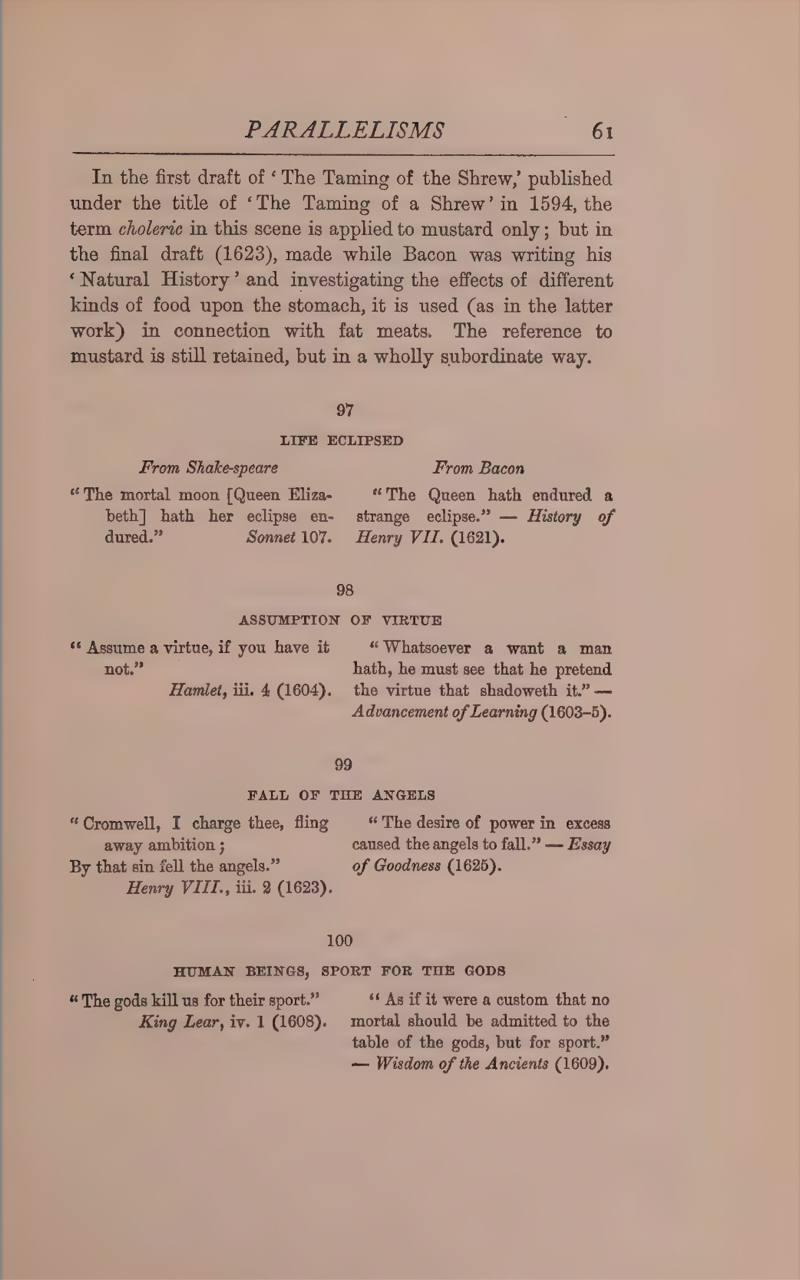
Edwin Reed’s Bacon and Shake-speare Parallelisms 1902
FEAR
Bacon: “Nothing is terrible but fear.” — De Augmentis Scientiarun.
Shakespeare: ‘Fears make devils of cherubins.” — Troilus and Cressida.
“Of all base passions, fear is most accursed.” —1 Henry VI
“Nothing is fearful but fear itself.” — Letter to Rutland (1596).
“ Nothing is to be feared but fear itself.” — Essex Device (c. 1592).\
“I cannot choose But weep to have that which I fear to lose.” —Sonnet 64 (1609)
Bacon: “To abstain from the use of a thing that you may not feel a want may not fear the loss of it, are the precautions of pusillanimity and cowardice.”” — Advancement of Learning (1603-5).
Bacon: “I will not use because I will not desire. I will not desire because I will not fear to want.’ —Essex Device (c. 1592).
History in The Plays: Bacon as one of Europe’s First Historians
There are ten plays in the Shakespeare canon concerned with English history. There are four set in the context or concerned with the history of ancient Rome. Three plays use characters that are taken from or reference the history of ancient Greece. Shakespeare showed an remarkable concern with history for a playwright. History as a subject of study in University did not exist at the time and it was rarely practiced as a discipline. A little known fact is that Francis Bacon was one of Europe’s first modern historians, and his History of the Reign of King Henry VII (1622) was a pioneering work that introduced new methods and standards to historical writing, significantly contributing to post-Roman study and the writing of modern history. Bacon's approach was groundbreaking and is one of the earliest examples of a methodical and analytical approach to historical writing, and it was highly influential for centuries. (6)
It’s very hard to imagine Stratford Will having the time and the access to books that would have enabled him to write so much historically-based drama. None of the other authorial candidates were obsessed by history as was Bacon. Bacon grew up amongst royalty and the elite power circles, and he had with access to enormous libraries, including Anne and Nicholas Bacon’s, who were both writers, and if he was the secret son of Queen Elizabeth I, as I believe he was, his deep interest in history had a personal motivation that added to his intellectual curiosity.
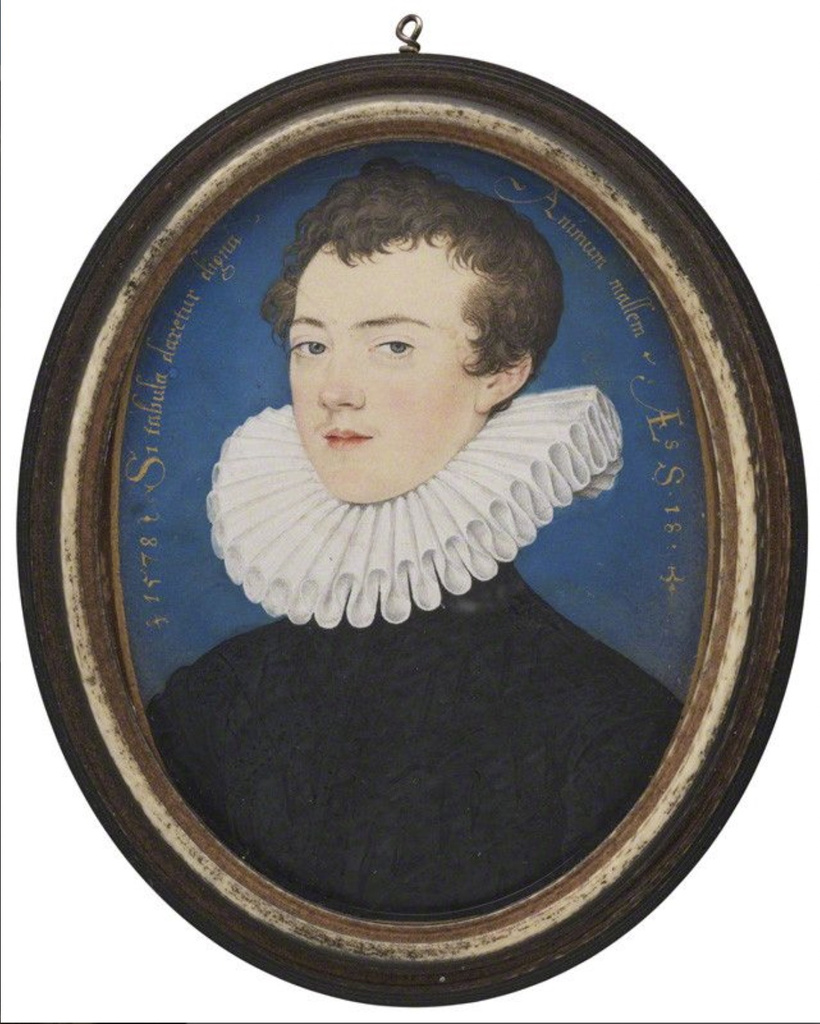
The Nicholas Hilliard portrait of Bacon as a teenager in France in 1576: “Could I But Paint His Mind” in Latin was a painteded at edges of portrait. Same wording as used by Ben Jonson as in the First Folio 1623
BEN JONSON’S CLUES
Ben Jonson, thought of as the second best playwright of early modern London was a friend of Francis Bacon. Ben Jonson was the heavyweight name that gives credence to and lends an air of authority to the First Folio’s praise of Shakespeare. The praise Jonson gives to Shakespeare however, points more to Bacon as the author than Shakespeare.
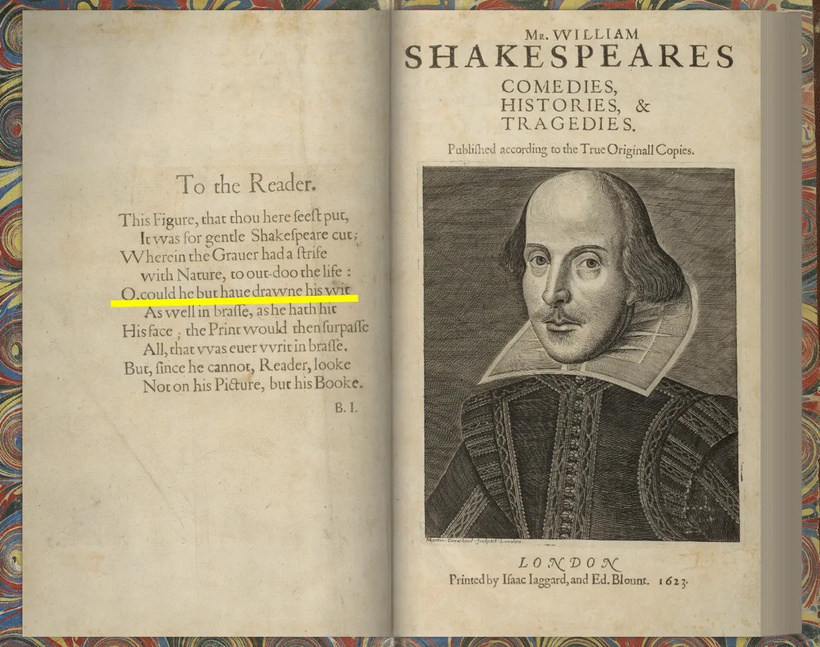
BEN JONSON DEDICATION (B.I.) in First Folio “O could he but have drawn his wit”
Ben Jonson actually duplicates the words used by Hilliard in his portrait of the teenager Bacon- “could I but paint his mind” and “could he have drawn his wit”
In another tribute to Shakespeare , Jonson uses the exact same words as he later uses in in describing Bacon
Tribute to Bacon:
“He, who hath filled up all numbers and performed that in our tongue which may be compared, or preferred, either to insolent Greece or haughty Rome… So that he may be named, and stand as the mark and acme of our language.”
Ben Jonson: Tribute to Francis Bacon, Explorata, or Discoveries – 1641
FIRST FOLIO: Ben Jonson tribute poem to Shakespeare
............. Or , when thy socks were on,
Leave thee alone, for the comparison
Of all, that insolent Greece or haughty Rome
sent forth, or since did from their ashes come.
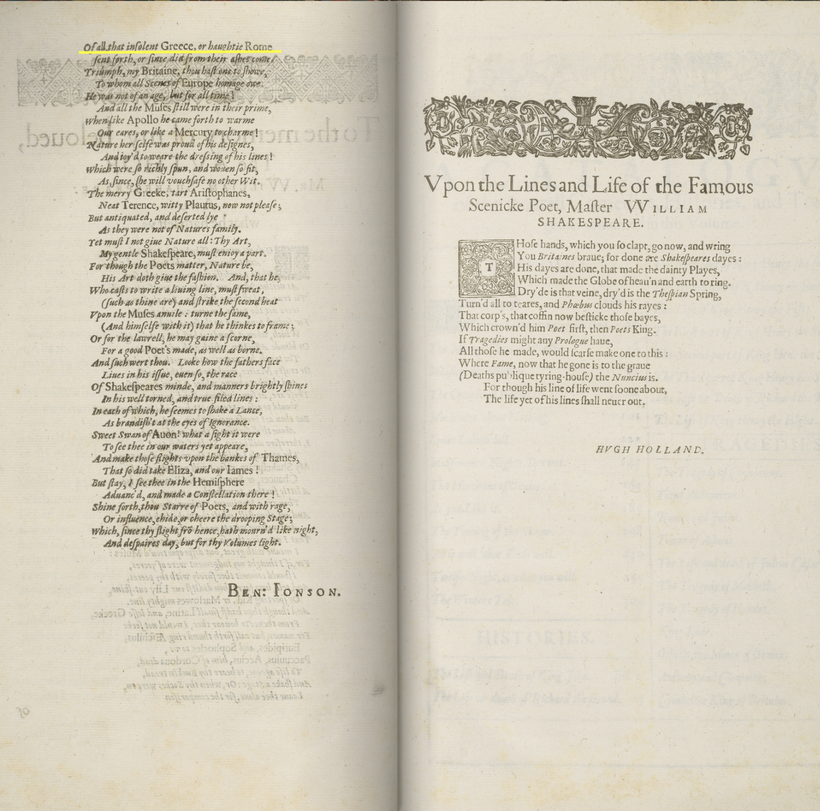
Ben Jonson "insolent Greece and haughty Rome" to describe Bacon and Shakespeare
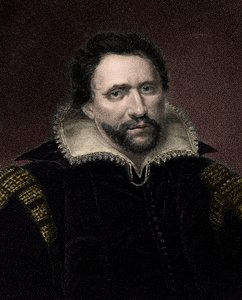
Ben Jonson
The Name SHAKE-SPEARE
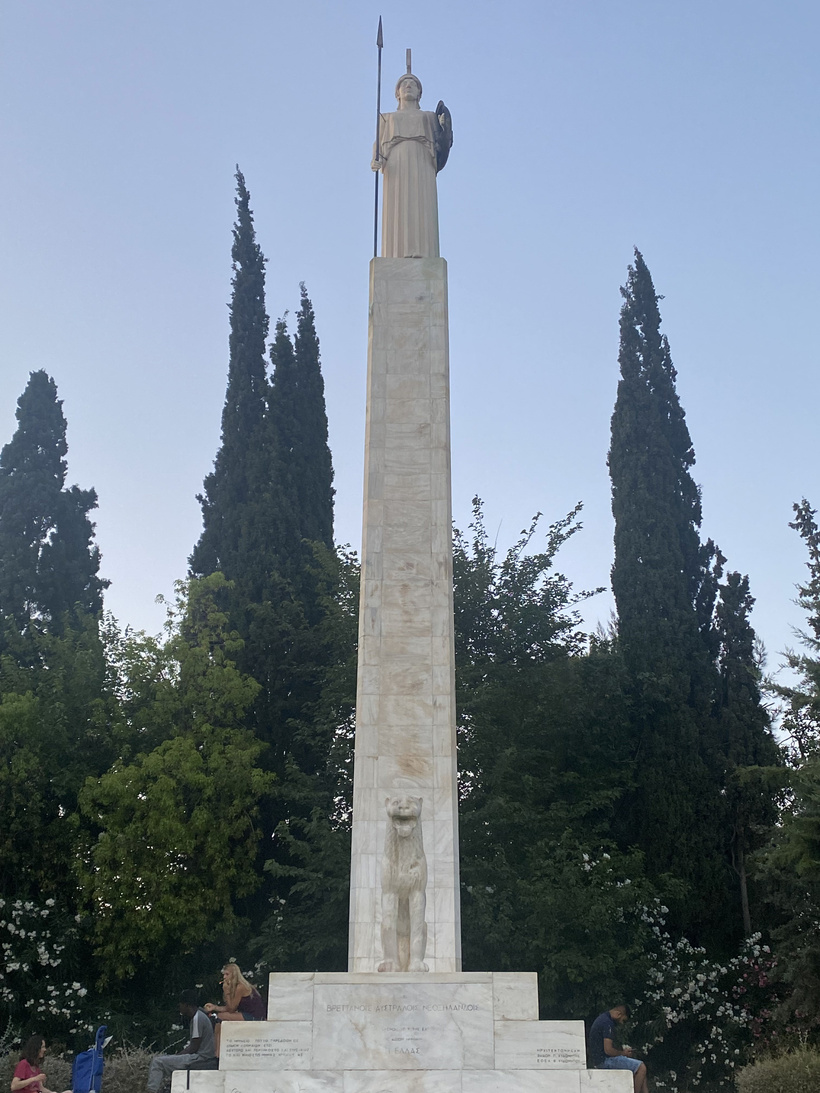
Statue of Athena In Athens, Greece
Ancient Athens and the ancient Greek philosophers and playwrights were a huge inspiration to Francis Bacon and other early modern elite Londoners, for good reason, as much of the wisdom and knowledge in the world is therein contained. Bacon was reading ancient Greek by the age of seven according to some biographers. Both of his parents were expert in Greek and Latin.
Poets in the Early Modern era would invoke a muse for inspiration. “Sing to me o muse…” Bacon’s muse was known to be Minerva. (See Manes Verulamiani below) and Minerva is the Roman name for Athena, the Goddess after whom the city of Athens is named. Bacon called Athena the ‘10th’ muse.
Athena, I swear to God on a stack of Bibles was known as ‘Spear Shaker’. Athena, also called Pallas Athena, “brandished” and was known “to shake” her spear. Shake-Speare, is how Stratford Will was first presented to the world, is a reference to the goddess Athena, an in-joke of ancient Goddess worship, the very Goddess of war, and wisdom who could also grant invisibility. Shake-Speare was made up for the project.
Walter Burkert, in his great book
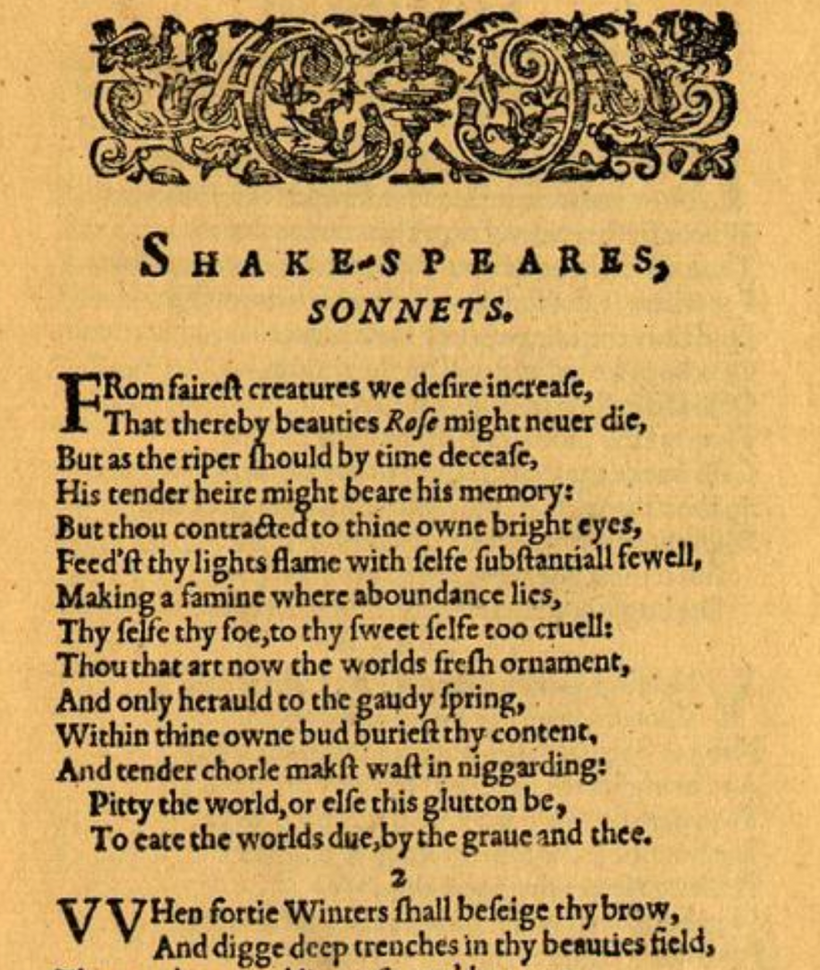
Greek Religion (1985): Suggests "Pallas" may relate to pallein ("to brandish”) p. 139
(The word "Pallas" may derive from the Greek verb pallein (πάλλειν), meaning "to brandish" or "to shake." This could refer to Athena’s association with weapons, particularly her spear, as she is often depicted as a warrior goddess. However, pallein more broadly implies "to wield" or "to vibrate”. Some scholars suggest "Pallas" could mean "maiden" or relate to a pre-Greek word, possibly from a non-Indo-European language, but this is speculative (Walter Burkert, Greek Religion, 1985, p. 139).
In some versions of the Perseus myth, Athena provides Perseus with divine aid, including access to the cap of invisibility. (Apollodorus, Bibliotheca 2.4.2–3).
Athena is the goddess of wisdom and warfare both. She is always portrayed with a spear (war), a serpent (wisdom), often with an owl (secret wisdom) and always with an elaborate helmet which was to Bacon a symbol of invisibility as it was associated with Hades’ cap of invisibility. Propaganda and social engineering are the invisible war which Bacon waged. Athena was the perfect symbol for Baron von Bacon.
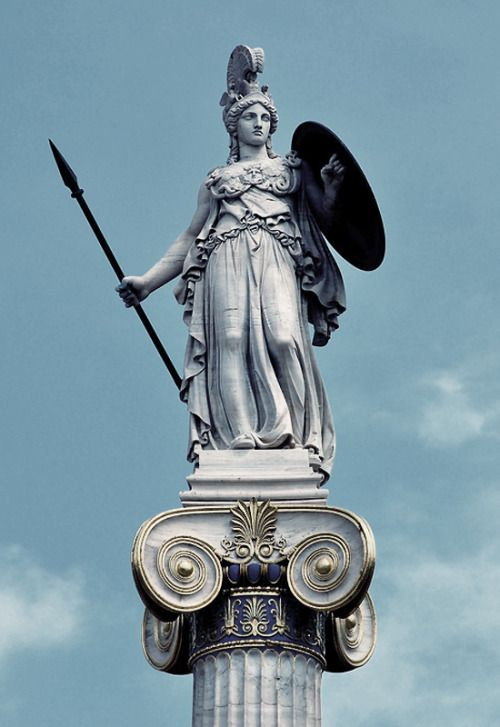
“In her left hand, Athena held a spear while a shield rested in front of it."
This shield was decorated with Amazonomachy and Gigantomachy, both elaborate scenes of battles between the gods and monsters. The opposite hand carried a small statue of Nike, the goddess of victory, representing the power of both Athena and her triumphant city. Athena stood on a platform decorated with the story of Pandora, which represents the goddess’s virginal aptitude. Together, the symbols of gorgons, amazons, giants, and women represented Athena’s glory as a warrior and savior.”
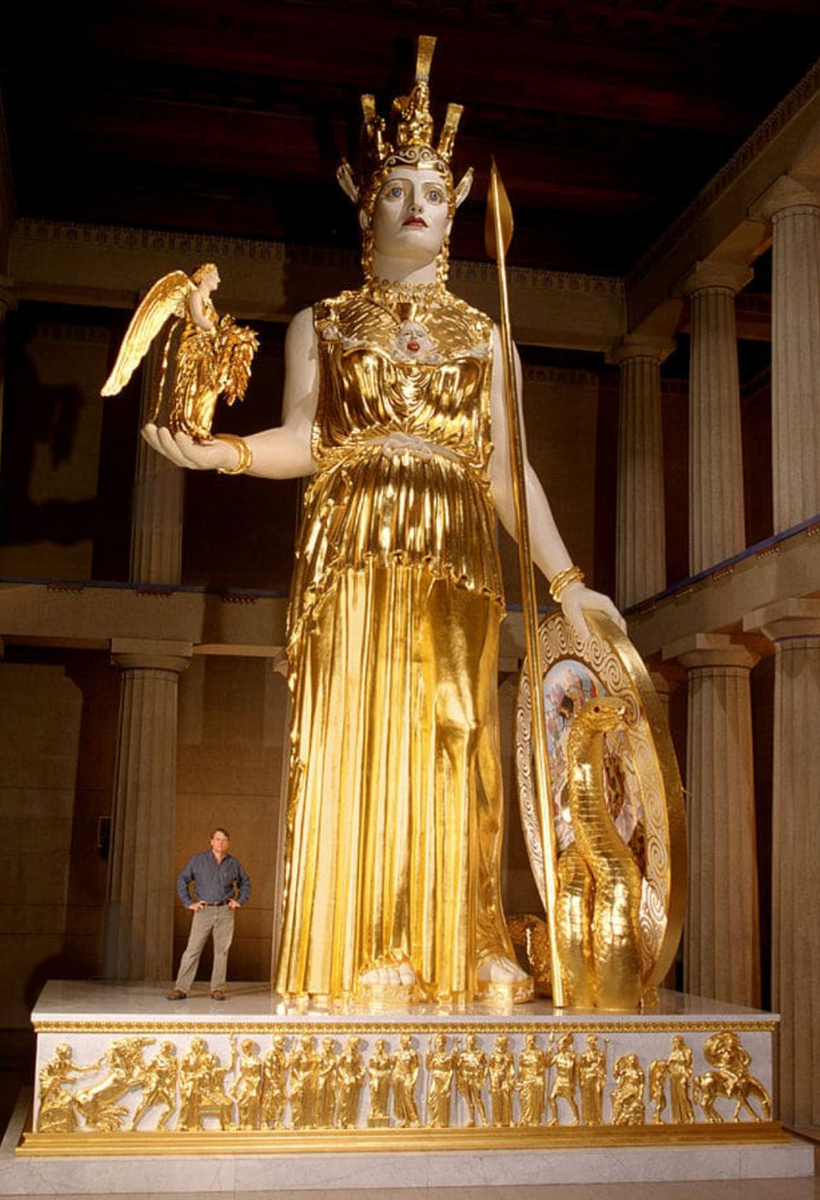
Athena Parthenos as she was on the Acropolis Ancient Greece
Artistic inspiration, war planning, invisibility, stealth and power fror symbolism while also fulfilling a unique style of goddess worship peculiar to Gnosticism- of Sophia, the reluctant feminine demiurge.
The early modern London elite fancied themselves as a new Athens, via Troy, via Rome and they also felt themselves to be a new Jerusalem, with a destiny they felt was to be greater than them all.
The Headpieces or Headstocks
Athena and Apollo were both on Mt. Parnassus, the mountain of the muses which loomed over the Oracle Of Delphi where prophecies were made in ancient Greece. An “A” for Athena and “A” for Apollo- were combined as an aspect of dualism, twin pillar and other twin symbolism. The different levels of meaning and symbolism in the combining of Apollo and Athena were endless for Baron Verulam as we will see, and he used a double “A” logo to decorate and indicate his writing.
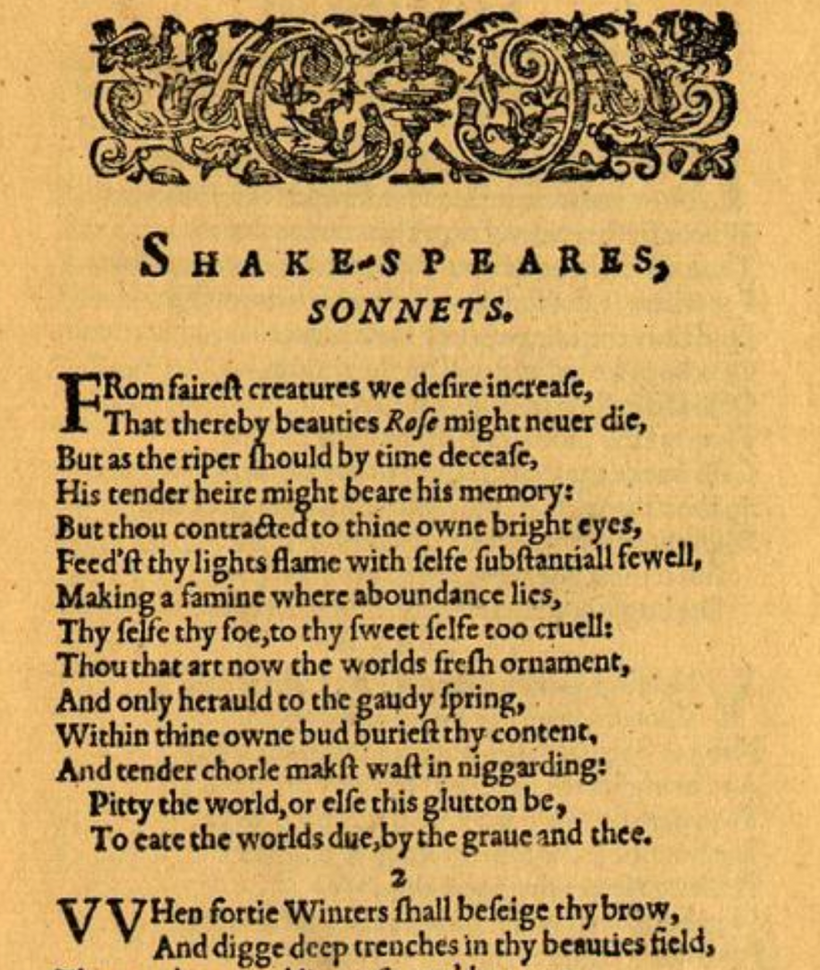
“Headpiece” of Double A’s found in Shakespeare. and on Bacon Writing
The twin A's of Athena and Apollo are prominently displayed on the very first printing of the Sonnets in 1609 with a headstock of double A's, Apollo and Athena. There are other messages within the images on the headstocks, a technique called steganography.
The Manes Verulamiani
The Eulogies to Bacon That Show Authorship
When Francis Bacon died in 1626 at age 65 (rumors that he faked his death are legion amongst the new Rosicrucians and other occult groups) there appeared an extraordinary book called the Manes Verulamiani, which contained thirty-two elegies to the memory of Francis Bacon from different writers. Many of the dedications emphasize Bacon’s association with Apollo and Athena. Some of the elegies state that Bacon was a supreme poet, second to none and the writer of unacknowledged literary work, associated with the theatre.
The following dedications from Manes Verulamiani show Bacon’s association with Minerva (Athena) and Apollo.
“The ardor of his noble heart could bear no longer that your divine Minerva, should be despised. His [Bacon‘s] godlike pen restored your wonted honour and as another Apollo dispelled the clouds that hid you…Pallas too, now arrayed in a new robe, paces forth, as a snake shines, when it has put off its old skin.”
Thomas Randolph, Trinity College
The very nerve of genius, the marrow of persuasion, the golden stream of eloquence the precious gem of concealed literature, the noble Bacon (ah! the relentless warp of the three sisters) has fallen by the fates. O how am I in verse like mine to commemorate you, sublime Bacon! and those glorious memorials of all the ages composed by your genius and by Minerva. R. C., Trinity College. Elegy 9, Manes Verulamiani (1626)
“None who survive him can marry so sweetly Themis the Goddess of Law to Pallas the Goddess of Wisdom” ~William Boswell
Is it thus falls the rarest glory of the Aonian band? and do we decree to entrust seed to the Aonian fields? Break pens, tear up writings, if the dire goddesses may justly act so. Alas! what a tongue is mute ! what eloquence ceases ! Whither have departed the nectar and ambrosia of your genius? How has it happened to us, the disciples of the Muses, that Apollo, the leader of our choir, should die? ….This suffces; these memorials will not let you die.
Williams
For more on the Manes and other tributes to Bacon that suggest authorship go here:
BACON AND THE THEATER
“The action of the theatre… was carefully watched by the ancients…. and, indeed, many wise men and great philosophers have thought it to the mind as the bow to the fiddle: and certain it is that the minds of men in company are more open to affections and impressions than when alone.” Francis Bacon, The Advancement of Learning 1605.
Bacon was connected to the theater throughout his life. He organized masques at Gray’s Inn (Masques are a type of theater more focused on dancing and reciting of poetry). In 1588 he collaborated with Sir Christopher Yelverton in producing “The Misfortunes of Arthur”, and in 1594 at the Christmas Revels at Gray’s Inn he was the principal organizer of the merry-makings as mentioned. One of the masques, the mimic “Prince of Purpoole”, represented a mock meeting of the Privy Council. In 1613-1614 he was responsible for a masque given jointly by Gray’s Inn and the Inner Temple to celebrate the marriage of the King’s daughter, Elizabeth (the Winter Queen) to Frederick V, the Count Palatine. In the following winter he is said to have spent upwards of 2,000 pounds in organizing a “Masque of Flowers.” As Lord Chancellor he dined at Gray’s Inn “to give countenance to” the Christmas Revels of 1617-1618, in the course of which a Masque was played by Members of the Inn before the King.
The Saint Albans Venus and Adonis Mural
In 1985 workers removing paneling from the walls of the White Hart Inn in St Albans England, the city where Francis Bacon had a home most of his life, discovered a mural that had been covered up for nearly four centuries, a huge painting that occupied three walls. The local St Albans authorities called in the Warburg Institute for an evaluation of the mural. Clive Rouse, expert on medieval paintings stated that the mural is a priceless discovery that rivals the paintings of Hampton Court, a palace used by Queen Elizabeth that’s just across the river Thames from Bacon’s Twickenham residence.
They further identified the painting to be a depiction of the death scene from Shakespeare‘s Venus and Adonis.
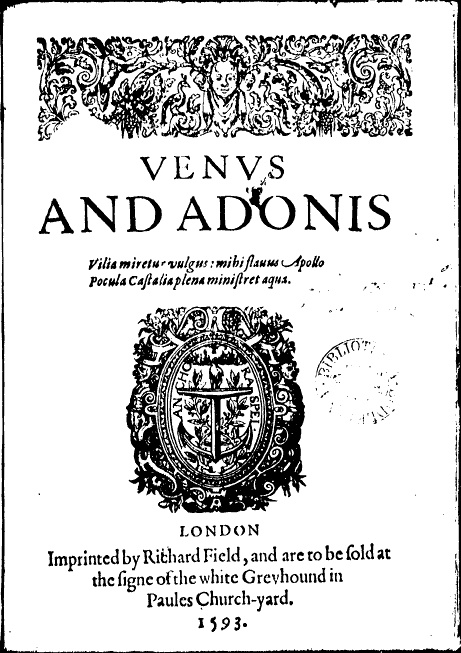
The very first poem to appear with William Shakespeare’s name on it was Venus and Adonis, long, highly sexual, inverted and neo-mythic in strict rhyme. It’s very telling that a painting dating from a time that Shakespeare and Bacon were alive is found in the town where Francis Bacon lived. Why wasn’t it found in Stratford?
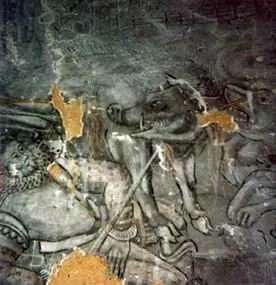
Bacon is Adonis!
Bacon Is Both Adonis And the Boar
I’ve seen the mural. What’s really fascinating is that the Adonis of ancient Greek myth, depicted in the mural, is clearly Francis Bacon in Elizabethan garb. The Adonis of ancient myth-a major figure in many ancient religions, transformed into Adonai in the Old Testament - was a dying and rising god, and he underpins the third degree ritual in Freemasonry, reconfigured and distilled into the architect Hiram Abiff.
Adonis is also a symbol of the Summer Solstice, the time when the ancient Adonis festivals took place in ancient Greece. The Sun as symbol is perhaps Freemasonry’s most important. The boar in the mural scene shown goring Adonis/Bacon is very similar to the boar that reigns over the Bacon family crest. Bacon is thus both Adonis and the boar in this painting. That’s a LOT to chew on.
Just above the boar‘s image, a large house resembling Gorhambury, the name of the former Bacon estate nearby, can be seen in the background, and to the side of that house stands the hill where Bacon frequently conducted his astronomical observations according to Bacon researcher Peter Dawkins. A horse in the scene, from part of the poem, holds a red (Tudor) rose in its mouth.
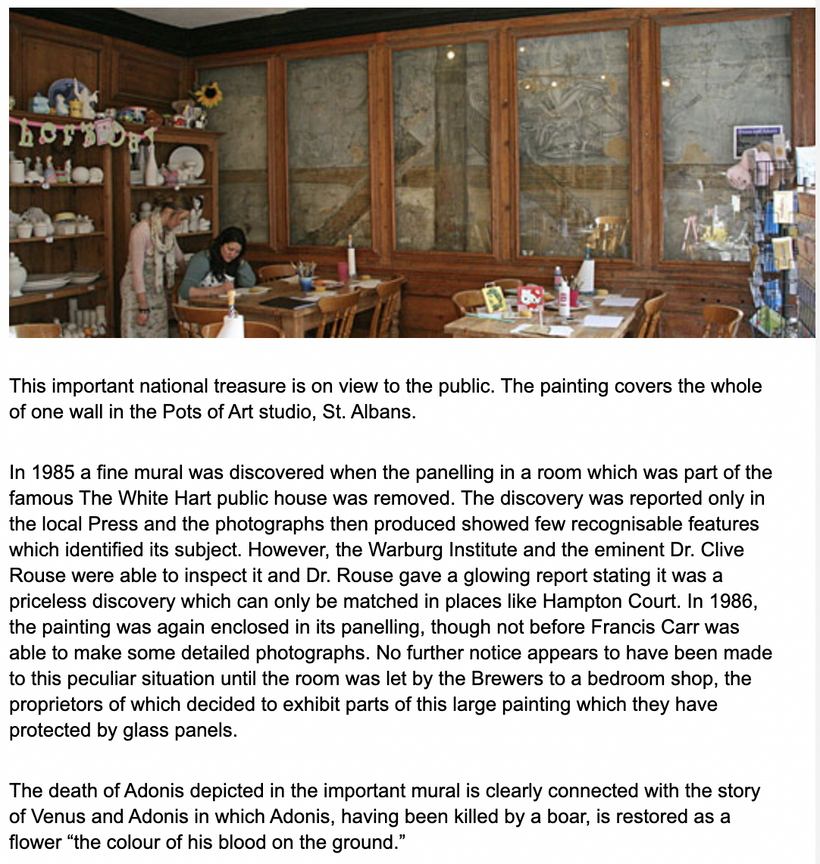
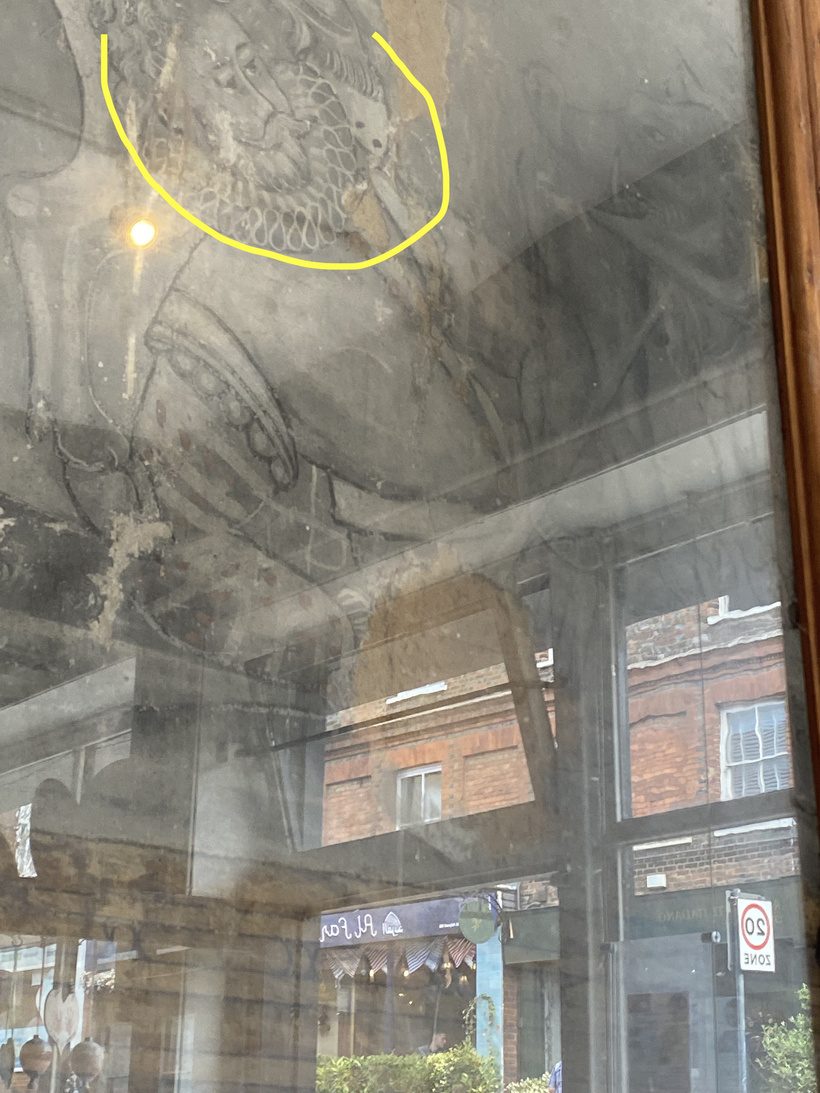
Bacon as Adonis in Elizabethan Garb. He’s also the Boar
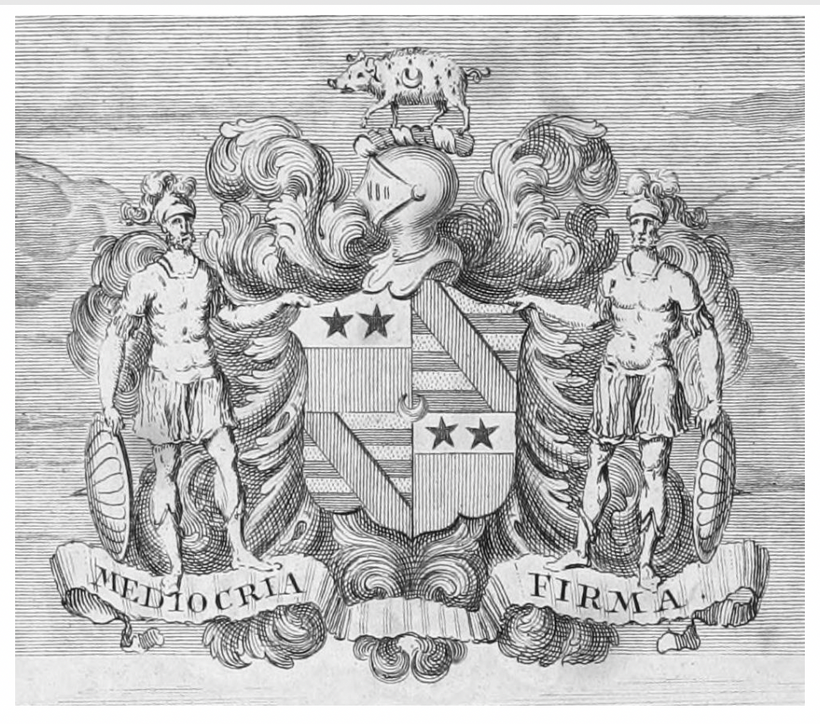
Bacon Family Crest with Boar
WHY THEY HID THE AUTHOR
If Lord Francis Bacon and his aristocratic crew of had been known as the author of the plays, then the plays would have been seen immediately for what they really are: audacious Tudor propaganda with the 10 history plays alone serving up an outrageously false history meant to be absorbed into the hearts of the English as truth, the purpose of which was to rebrand the deceitful, murderous Tudor regime into the divinely sent saviours of England, and by extension all humankind, serving to elevate and glorify war for a land described in the plays as the “seat of Mars” and “this sceptered isle”. The plays eventually had such a tremendous impact they and their Mythic author became the heart and soul of England and the inspiration of the British Empire, by design. Every Empire needs a national poet, so Bacon needed a frontman because nobody would have worshipped Francis Bacon, the dirty lawyer/politician.
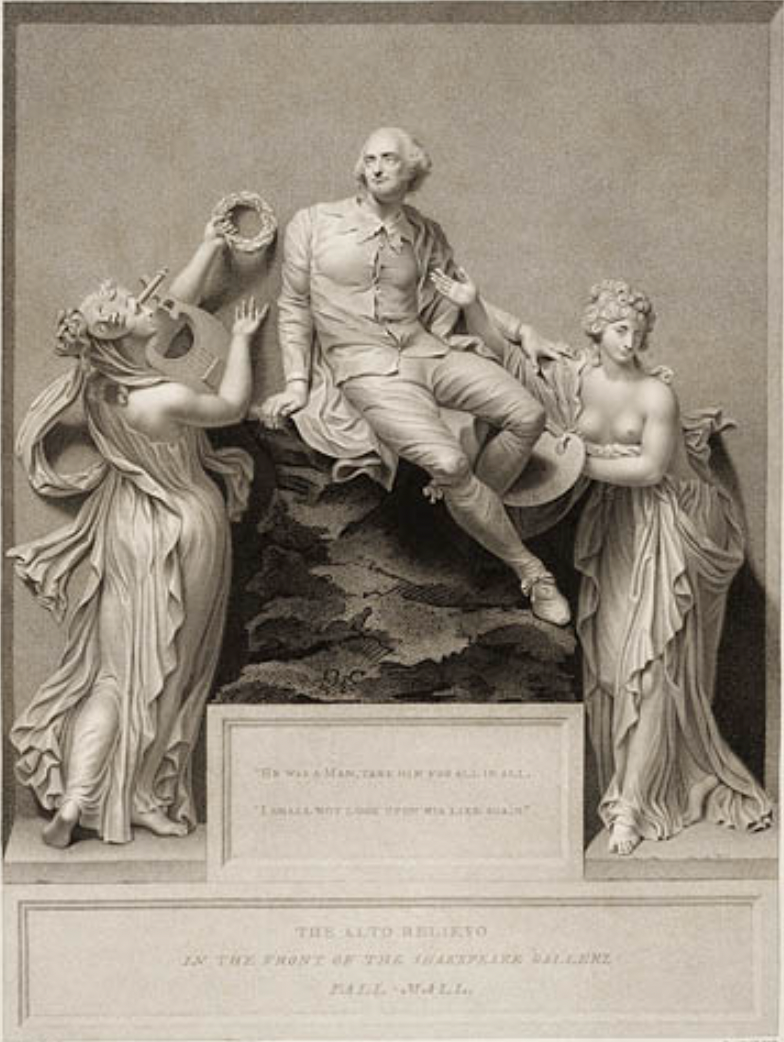
“Shakespeare Attended by Painting and Poetry” etching of the 1788 Thomas Banks' sculpture.
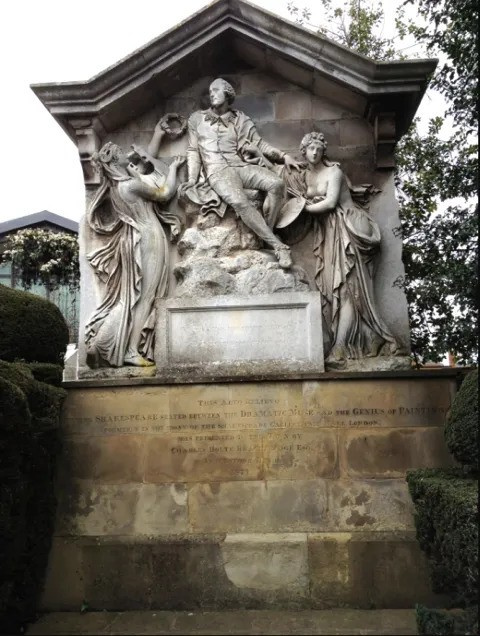
“Shakespeare Attended by Painting and Poetry”, the original London sculpture, now in Stratford, inscribed with a quote from Hamlet: "He was a Man, take him for all in all, I shall not look upon his like again".
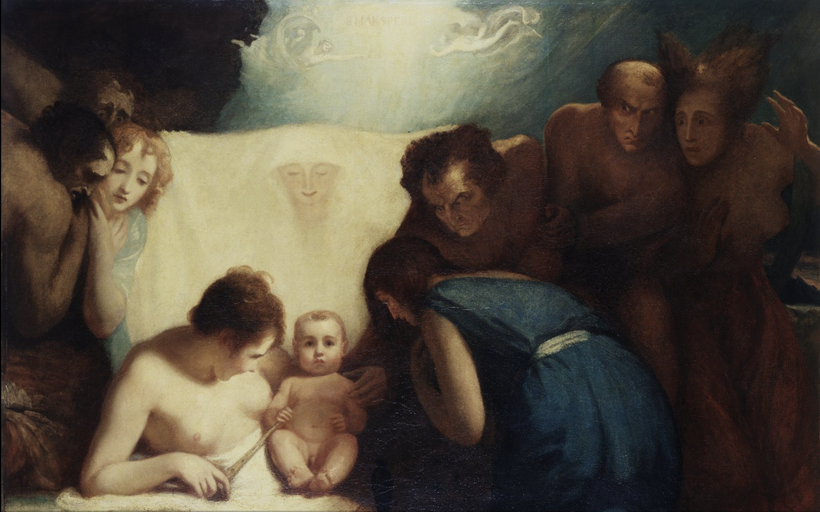
George Romney-The infant Shakespeare attended by Nature and the Passions, c. 1791–1792
Bacon, as copius evidence shows, saw to it all and he had a hand in all of it, not only the Shakespeare plays and poems, but in every aspect of Empire, from his cheerleading and advocacy for war as a statesman (9*), to the invention of the technology of war as a philosopher and cheerleader of a new science that first brought the industrial revolution to London, to helping form and finance the world’s first corporations, (10*) while sitting on the board as a lawyer and propagandist for the first successful American colony-The Virginia Corporation that settled Jamestown.
As Ben Jonson said to him at his 60th birthday party, just before Bacon’s famous ‘fall from grace’ (which gave him all the time he needed to complete the First Folio): “You stand as if a mystery thou didst”. (11*)
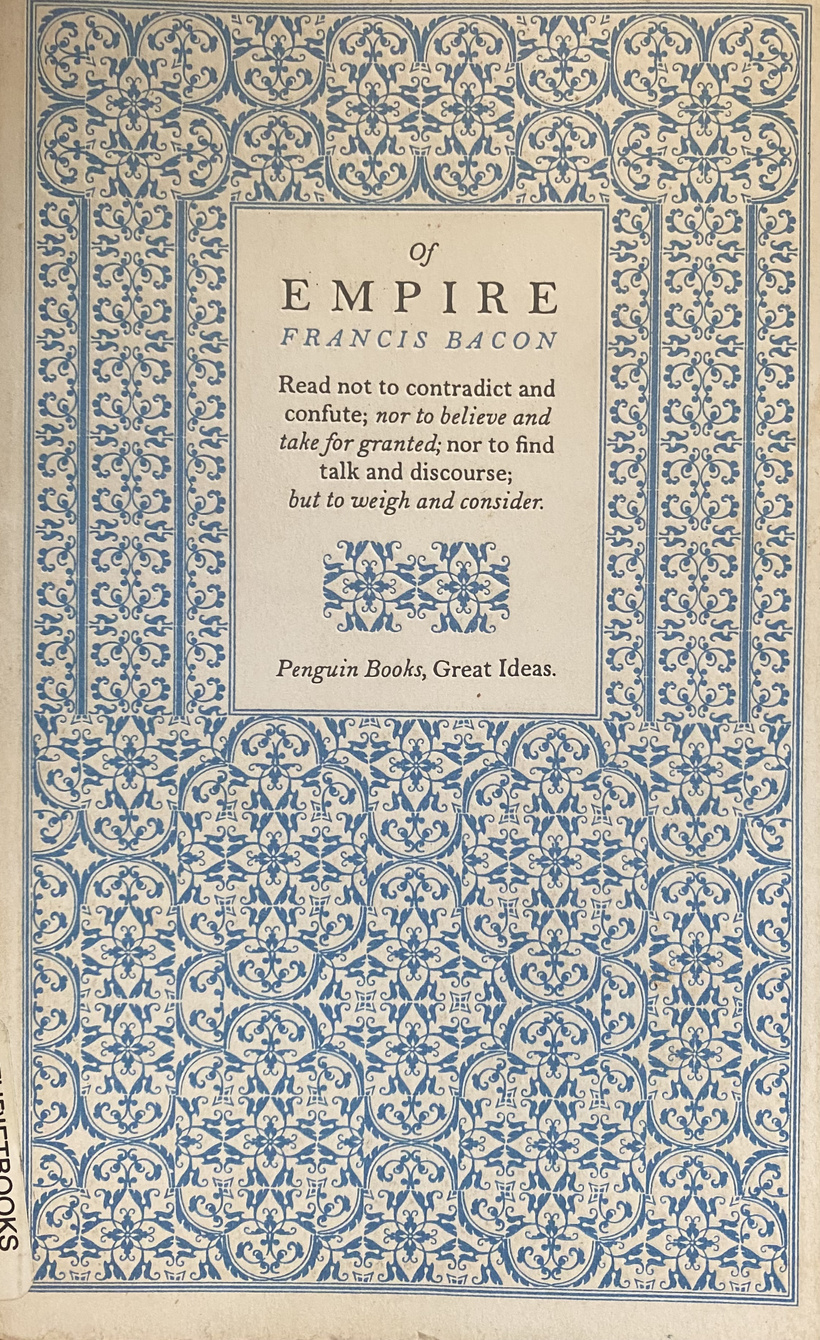
Bacon’s famous Essays. Many of the pieces deal with the “temper of empire” with titles such as “Of Empire”
By the way, the colonization of Jamestown, Virginia is a major theme of the Shakespeare play The Tempest, the very first play in the First Folio. All the world’s a stage and now Shakespeare is everywhere.
“Knowledge is power” is Bacon’s most famous quote outside of the theater. He meant it imperially and he proved that it was true. He prophesied that a great Empire would result from a union with Scotland in “Of The True Greatness Of Kingdoms And Estates”. Why is knowledge not love, compassion, unity or beauty? Because those things are not what Francis Bacon wanted and they are not in the Shakespeare plays either. Francis Bacon had a disease, an all-too-human disease: he wanted power, and disease is contagious in the theater, which Bacon loved:
“The action of the theatre… was carefully watched by the ancients…. and, indeed, many wise men and great philosophers have thought it to the mind as the bow to the fiddle” Francis Bacon, The Advancement of Learning 1605.
Foul Deeds Will Rise: Welcome To The Show
The irony of course is that the plays were not written by an unlettered miraculous rustic of whom the facts show could barely handle a pen, the deep irony is that the plays were written by one of the most educated men in history, steeped in the classic literature having real all of it. much of it in the original Latin and Greek.
Shakespeare has been described as a poet of ‘universal wisdom’ and this ‘master, this titan, this genius’. This perception of ‘universal wisdom’ mirrors Bacon’s declaration in a famous letter to his powerful uncle Secretary of State William Cecil Lord Burliegh, that he had taken “all of knowledge for his province”. It also, remarkably reflects statements madre regarding Bacon’s great genius made in memorium to him just after his death in the Manes Verulamiani collection discussed below.
But for the plays to work, it was important that the author be not a group of aristocrats but a most unusual one-of-a-kind genius who had miraculously created the plays out of the purity of his simple English heart, a pure English genius. This was a key component to generating a great national Myth that later became known as Bardolatry.
This perception of incredible historical genius could only be achieved by using more than one author, bound together by a central organizing principle. That organizing principle was Francis Bacon’s enormous intellect and outsized desire for Empire, the Empire for which he recognized the need for a national poet, for an emotional center for the British Empire that he prophesied in “Of The True Greatness Of The Kingdom of Britain” one hundred years before in started to happen . (12*) Professor Zagorin’s recent biography Francis Bacon, which includes a penetrating analysis of Bacon’s work (non-Shakespeare 😉 ) made note of Bacon’s obsession with Empire. (3*)
As a statesman Bacon was an inveterate war monger. (9*)
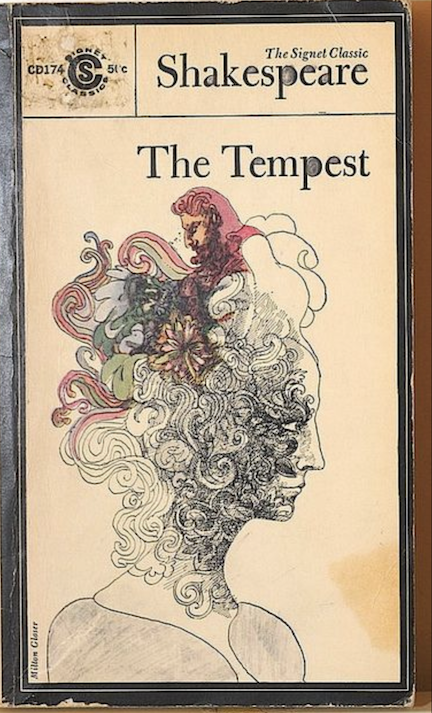
An Empire Of The Mind With Bacon As Prospero
I further propose, based on solid evidence that the Shakespeare plays are part an operation that included Bacon’s creation and involvement with Freemasonry. Freemasonry facilitated the popularity of the plays. Freemasonry was a key component of the building of Empire. Freemasonic imagery saturates the Shakespeare plays, and the earliest known use of grouped Freemasonic imagery is always associated with Francis Bacon and/or the Shakespeare plays, which is curious because Freemasonry didn’t officially exist until 1717.
Freemasonry was also involved in the birth of modern Science that gave England the technology of conquest.
It’s not a coincidence that the culture that created the Shakespeare hoax and the remarkable plays also created modern banking and finance, modern Science, modern espionage and the most successful secret society of all time-Freemasonry? All of these world-changing creations were designed for power, to create England as Empire, to be the greatest Empire in the history of the world, and like Bacon himself, eventually grow to be virtually invisible as an empire inside your head.
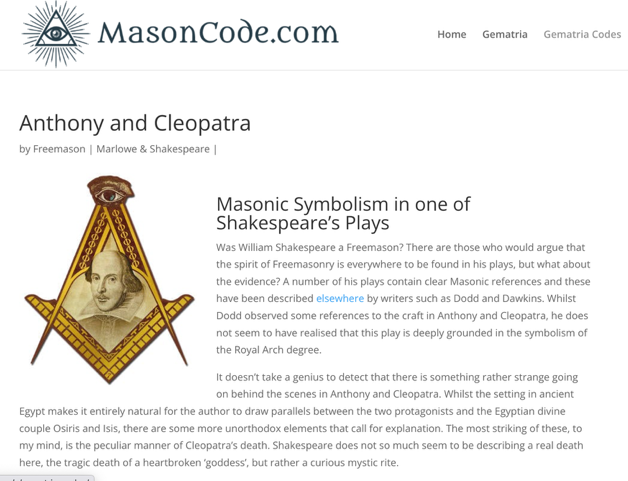
For Decades, Teasing Out The Freemasonic Imagery In The Plays Has Been A Thing
The Lack Of Evidence For Stratford Will And The History Of The SAQ
For more details on the complete lack of hard evidence for William Shakespeare writing the plays see Diana Price: Shakespeare's Unorthodox Biography
Also here: On The Impossibility of Shakespeare Writing The Plays or Why The Shakespeare Hoax is SO Important
Also see actors Mark Rylance and Derek Jacobi’s excellent “Statement Of Reasonable Doubt”.
Two excellent recent books on the history of the SAQ are Who Wrote Shakespeare by John Michel and Shakespeare Was A Woman and Other Heresies by Elizabeth Winkler. (Though Winkler somehow misses the Promus Notebook!)
There’s More To Come
I will be adding to this essay. There is a STILL A LOT MORE EVIDENCE that Bacon was the true author of the plays.
God Bless, Be Strong, Be Healthy, Love The World. ~Robert Frederick.
FOOTNOTES
(1) Everything about the Promus Notebook here
(2) Andrew, Christopher, The Secret World: A History Of Intelligence, Yale U. Press p. 158
(3) Zagorin, Peter. Francis Bacon, 1998 Princeton U. Press p. 153-161. In this fabulous biography and examination of Bacons many writings, Zagorin discovers and goes into depth about Bacon’s obsession with building an Empire.
(4)Cockburn, NB, 1992 The Bacon Shakespeare Question Made Sane
(5) Ben Jonson and Bacon were close friends. (Ian Donaldson, Ben Jonson A Life Oxford University Press 2011. George Greenwood, Ben Jonson and Shakespeare (London: Cecil Palmer, 1921, p. 43.)
(6) Bacon and History Writing https://en.wikipedia.org/wiki/History_of_the_Reign_of_King_Henry_VII
(7) Cockburn, NB, 1992 The Bacon Shakespeare Question Made Sane p.55
(8) Clarke, Barry Francis Bacon’s Contribution To Shakespeare Routledge (2017) p.130
(9) BACON THE WAR MONGER Considerations Touching a War with Spain- a policy paper by Bacon for Prince Charles and the Duke of Buckingham. The Works of Francis Bacon, Volume X (Letters and Life, 1868)
“Bacon is clear in the first version of his essay ‘Of the True Greatness of Kingdomes’, published in 1612, that true greatness means greatness in war. As he puts it,‘the breed and disposition of the people’ should‘be militarie’. In the 1625 version of the essay Bacon expanded this thought considerably, asserting that ‘the Principal Point of Greatnesse in any State, is to have a Race of Military Men’. And he joined to this thought the striking new suggestion that a truly great state must always be ready to find ‘just Occasions (as may be pretended) of Warre’.
Francis Bacon, colonisation, and the limits of Atlanticism Richard Serjeantson
Francis Bacon on Imperial and Colonial Warfare. Samuel Garrett Zeitlin, The Review of Politics 83 (2021), 196–218.
(10) Spedding “Letters and Life” volume XI
(11) The quote appears in Ben Jonson’s poem “Lord Bacon’s Birthday,” published in The Works of Ben Jonson (1640, posthumous collection).
Hail, happy genius of this ancient pile!
How comes it all things so about thee smile?
The fire, the wine, the men! And in the midst,
Thou stand’st as if some mystery thou didst!
Pardon, I read it in thy face, the day
For whose returns, and many, all these pray:
And so do I. This is the sixtieth year
Since Bacon, and thy lord was born, and here;
Son to the grave wise Keeper of the Seal,
Fame, and foundation of the English weal.
…
(The Works of Ben Jonson, 1640, “Underwoods” section)
(12) “Of The True Greatness Of The Kingdom of Britain” a speech given to the House of Commons Bacon prophesied that England united with Scotland would grow into a great monarchy.






